Command & Conquer: Red Alert 2
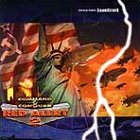 Hailed by many gamers as a big improvement over Command & Conquer: Tiberian Sun, Red Alert 2 refined the 3-D graphics engine introduced in its predecessor – and it rocked out the music. If there’s one thing that makes the Red Alert 2 soundtrack – which was available from Westwood Studios for a limited time around the game’s release – stand out from the rest, it’s a refreshing blast of heavy metal guitar. The real standout here is the blistering, fast-paced “Destroy”, though there are close runners-up: “Grinder” and “Industrofunk”. The six-string pyrotechnics are a nice addition to the by-now-familiar C&C style of techno music, but the old style isn’t completely lost – tracks
Hailed by many gamers as a big improvement over Command & Conquer: Tiberian Sun, Red Alert 2 refined the 3-D graphics engine introduced in its predecessor – and it rocked out the music. If there’s one thing that makes the Red Alert 2 soundtrack – which was available from Westwood Studios for a limited time around the game’s release – stand out from the rest, it’s a refreshing blast of heavy metal guitar. The real standout here is the blistering, fast-paced “Destroy”, though there are close runners-up: “Grinder” and “Industrofunk”. The six-string pyrotechnics are a nice addition to the by-now-familiar C&C style of techno music, but the old style isn’t completely lost – tracks  such as “Probing” and “Fortification” are pure old-school C&C cues that wouldn’t have been out of place in the original game.
such as “Probing” and “Fortification” are pure old-school C&C cues that wouldn’t have been out of place in the original game.
This may actually be my favorite soundtrack from the Command & Conquer games, simply because it’s so different from the others, while still keeping the “feel” of what came before it.
- HM2 (3:44)
- Industrofunk (3:12)
- Ready The Army (4:57)
- Grinder (2:27)
- In Deep (3:24)
- Motorized (4:02)
- Power (3:56)
- 200 Meters (4:12)
- Destroy (4:38)
- Burn (4:37)
- Probing (4:19)
- Blow It Up (3:11)
- Eagle Hunter (4:16)
- Fortification (4:02)
- Jank (3:46)
- C&C In The House (4:06)
Released by: Westwood Studios / Electronic Arts
Release date: 2001
Total running time: 62:49
Weird Al Yankovic – Even Worse
 Does Weird Al Yankovic love to take his swipes at Michael Jackson, or what? Once again, Al takes aim at Jackson – and tacks on yet another food theme – with “Even Worse”. Now, there’s no song by that title, but te cover art is clearly a spoof of Jackson’s buckle-covered Bad image, quite possibly the last time Jackson wasn’t too weird to be cool (well, arguably). But Bad is transformed into “Fat”, a littany of fat jokes which really worked better with the bizarre video than it does as a stand-alone song. Also not working in Even Worse‘s favor is “Stuck In A Closet With Vanna White”, a tune whose entire point seemed to be to cash in on the Wheel Of Fortune hostess’ then-inescapable ubiquity. (Truthfully, Al missed the mark here – had the song gotten out around 1988, he might’ve had a hit, but that prize went to someone else’s spoof.) “(This Song’s Just) Six Words Long” is a guilty favorite of mine, a spoof of George Harrison’s “(I Got My Mind) Set On You” which pokes fun at the original’s ever-so-slightly repetitious lyric. “You Make Me” seems to be yet another Devo style parody, and falls into the disposable category.
Does Weird Al Yankovic love to take his swipes at Michael Jackson, or what? Once again, Al takes aim at Jackson – and tacks on yet another food theme – with “Even Worse”. Now, there’s no song by that title, but te cover art is clearly a spoof of Jackson’s buckle-covered Bad image, quite possibly the last time Jackson wasn’t too weird to be cool (well, arguably). But Bad is transformed into “Fat”, a littany of fat jokes which really worked better with the bizarre video than it does as a stand-alone song. Also not working in Even Worse‘s favor is “Stuck In A Closet With Vanna White”, a tune whose entire point seemed to be to cash in on the Wheel Of Fortune hostess’ then-inescapable ubiquity. (Truthfully, Al missed the mark here – had the song gotten out around 1988, he might’ve had a hit, but that prize went to someone else’s spoof.) “(This Song’s Just) Six Words Long” is a guilty favorite of mine, a spoof of George Harrison’s “(I Got My Mind) Set On You” which pokes fun at the original’s ever-so-slightly repetitious lyric. “You Make Me” seems to be yet another Devo style parody, and falls into the disposable category.
If it’s starting to sound like Weird Al struck out with Even Worse, fear not, it gets better. “I Think I’m A Clone Now” is a subtly amusing parody of Tiffany’s cover of “I Think We’re Alone Now”, right down to the straight-off-the-assembly-line bubblegum pop production sound, and “Lasagna” is a brilliant (and, once again, food-obsessed) take on “La Bamba”, which had just gotten some recent exposure thanks to Los Lobos. “Melanie”, one of my favorite Yankovic originals ever, is a little song sung from a stalker’s point of view, and performed as a catchy pop number a la Elvis Costello’s “Veronica” or later-era Toad The Wet Sprocket.
Yet another cover of a cover, “Alimony” lays waste to Billy Idol’s then-recent cover of “Mony Mony”. “Velvet Elvis” is one of those original songs that I could do without, while “Twister” takes, word-for-word, the original Milton Bradley TV ad for the party game of the same name and twists it into a Beastie Boys-style rap. “Good Old Days” is an original number which sets fire to James Taylor’s signature style of folk-pop and runs away snickering.
Given that In 3-D and Dare To Be Stupid were a couple of my all-time favorite albums at the time, I remember – even in 1990 – somehow expecting more out of Even Worse. For whatever reason, perhaps because rock music was confined to dull arena acts like Poison, pop producers were unleashing teenyboppers with the musical equivalent of pre-fabricated metal shacks, and rap was  starting to take over, Al just didn’t seem like he was firing on all cylinders here. In fact, it seemed like his next couple of CDs weren’t as on-the-mark either, and I was always disappointed that the seemingly obligatory polka medley – still a better demonstration of Yankovic’s musicianship and comic genius than any of his single-song spoofs – was missing.
starting to take over, Al just didn’t seem like he was firing on all cylinders here. In fact, it seemed like his next couple of CDs weren’t as on-the-mark either, and I was always disappointed that the seemingly obligatory polka medley – still a better demonstration of Yankovic’s musicianship and comic genius than any of his single-song spoofs – was missing.
- Fat (3:37)
- Stuck In A Closet With Vanna White (5:01)
- (This Song’s Just) Six Words Long) (3:37)
- You Make Me (3:05)
- I Think I’m A Clone Now (3:20)
- Lasagna (2:47)
- Melanie (3:59)
- Alimony (3:16)
- Velvet Elvis (4:30)
- Twister (1:04)
- Good Old Days (3:22)
Released by: Scotti Bros.
Release date: 1990
Total running time: 37:38
Fortress: The Music of Sting
 Some works of pop and rock music beg to be orchestrated more richly, to put their original electric or electronic sound into a classical context to see if the music, at its most basic, can survive the translation without losing too much. And occasionally, the original music is already so well arranged and thought-out, there’s no need to try to make that paradigm shift happen.
Some works of pop and rock music beg to be orchestrated more richly, to put their original electric or electronic sound into a classical context to see if the music, at its most basic, can survive the translation without losing too much. And occasionally, the original music is already so well arranged and thought-out, there’s no need to try to make that paradigm shift happen.
And this is the fence straddled by the London Symphony Orchestra’s Fortress, an orchestral reworking of songs by Sting and the Police arranged and conducted by Darryl Way. In some places, the new context suits the songs well, and it comes out sounding rather fun – the busy, Gershwinesque treatment of “Synchronicity II” comes to mind here. In other places, especially with Sting’s solo material, there was already a session orchestra, or a portion of one, playing on the original recording, and parroting that material (and the arrangement) comes across as more of an exercise in making a karaoke album (“Moon Over Bourbon Street” is especially guilty of this).
And then there’s the other stuff, the stuff that just seems to lumber around with unremarkable arrangements. In most cases, the original rock recordings were quite interesting, but here, songs like “Invisible Sun” and “King Of Pain” become frightfully bland, resembling a weak marching band arrangement more than anything. Maybe I’m too attached to those songs in their original form to be completely objective, but at least half of this album barely evoked a reaction of active like or dislike at all. Not something I’m used to from songs written by Sting.  (Thank God this album pre-dates “Desert Rose”.)
(Thank God this album pre-dates “Desert Rose”.)
I’ve heard successful orchestral translations of songs by Led Zeppelin and Split Enz before, so I know that more could have been done with Sting’s catalogue than this. I can only give Fortress a cautious recommendation as a curiosity.
- Russians (5:25)
- Moon Over Bourbon Street (5:11)
- Synchronicity II (5:29)
- Fortress Around Your Heart (5:46)
- King Of Pain (4:50)
- Invisible Sun (4:09)
- Every Breath You Take (5:58)
- Why Should I Cry For You (5:22)
- Wrapped Around Your Finger (5:19)
- They Dance Alone (5:52)
Released by: Angel
Release date: 1995
Total running time: 53:21
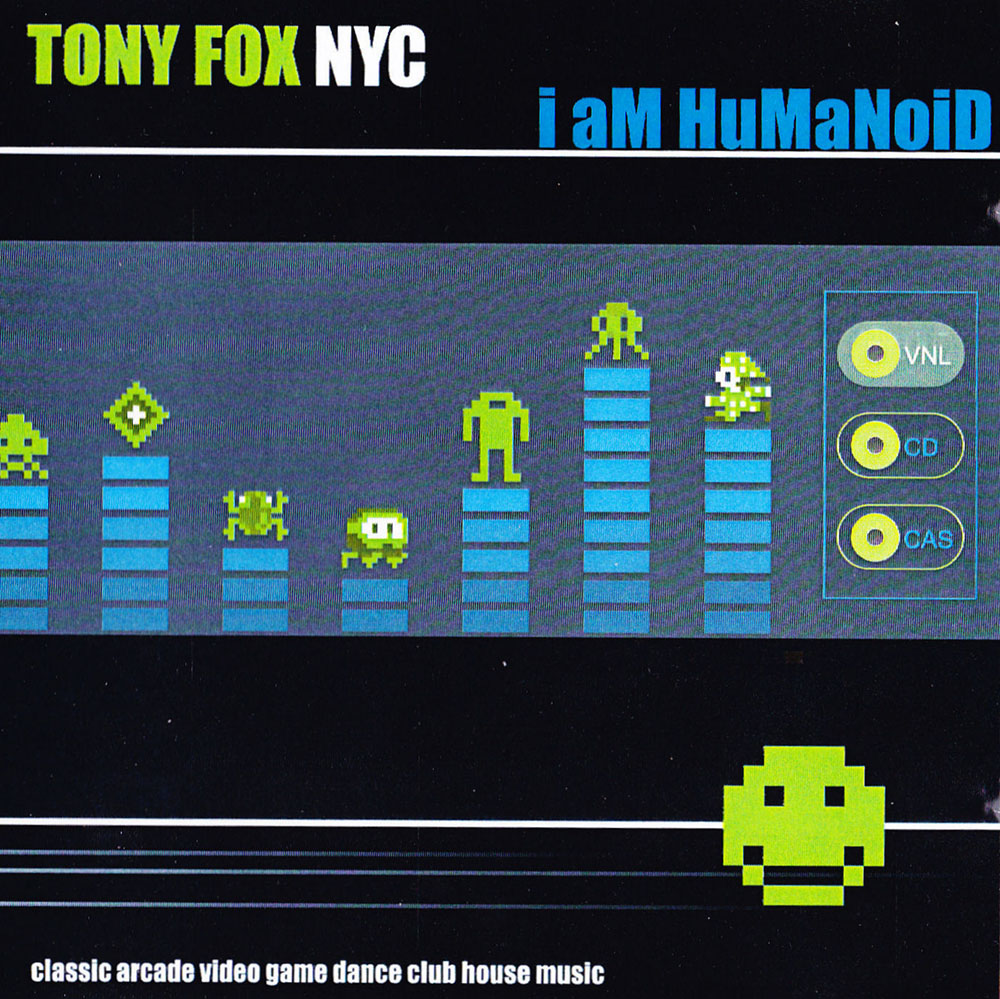
Tony Fox NYC – I Am Humanoid
What do you get when you put Queen, Art Of Noise, and quite a few others into a blender with a bunch of classic video game sounds? Probably a bunch of chopped-up CDs, especially if the blender’s set on pureè. If you run the same ingredients through Tony Fox’s mixer, however, the result is I Am Humanoid, Fox’s master-mixing tribute to the arcade games of yesteryear.
One thing that differentiates I Am Humanoid from, oh, say, the recent Scitron Digital game sound CDs is that Fox focuses not just on sound effects, but music. Most of the games whose sounds he used have catchy little musical themes, not just sound effects, and in a lot of ways that fires up the memories more than a simple sound effect never could. Games without music are called into play too, however – “vocals” are provided by the likes of Sinistar, the Berzerk robots, the talking green cyclops from Space Fury, and the sampled superstar voices of Star Trek.
There are three versions of the title track (my favorite is still the original mix minus the extra padding), a tribute to Star Trek (both the game and the original series), and game-specific cuts focusing on such coin-op classics as Jungle King, Astro Blaster, Gyruss and Punch Out!. The whole thing kicks off with a thumpin’ remix of the hard-rock Reactor theme, given an extra boost of kick-ass energy by the “stomp-stomp-clap” rhythm of Queen’s “We Will Rock You” and some samples from Crystal Castles to boot. The tracks that mix and match the sounds from wildly different games are the most effective, but that element is present everywhere; even in the Star Trek-specific track, when Spock’s voice announces “Sector four – intruder alert,” the Enterprise is apparently invaded by Q*Bert and his chattering chums. (Who here wouldn’t love to see a video for that?) And the crazy thing is, it works – there are few things more alien-sounding than the orange one’s garbled “speech.”
There’s an untitled track at the end of the CD, signified on the track list by the dragon from Adventure, and while on the surface it appears to be yet another reworking of the basic “I Am Humanoid” idea, in some ways it’s the best track on the whole disc. Melding a motley assortment of game samples with a Philadelphia-style 70s brass backing, it manages to bring the games together with a sound that those of us who were there  remember quite well. It’s hard for me to hear it without getting a big grin on my face – which pretty much sums up the whole CD.
remember quite well. It’s hard for me to hear it without getting a big grin on my face – which pretty much sums up the whole CD.
Tony Fox’s I Am Humanoid is still available while supplies last from Digital Press.
- Crystal Reactor (2:56)
- Hop To It! (Frogger remix) (2:34)
- I Am Humanoid (Humanoids Love House Music remix) (3:28)
- Tetris Invaders (4:24)
- Phoenix 2002 (3:18)
- Jungle Rush (Jungle Hunt remix) (3:27)
- I Am Humanoid (original version) (4:37)
- Prepare For Battle (Digital Press theme) (3:57)
- A Day @ Tony’s Arcade (Mega Mix) (5:17)
- Welcome Aboard, Captain (Star Trek remix) (4:03)
- Warp Activated (Astro Blaster remix) (2:59)
- I Am Humanoid (Save The Robots remix) (4:54)
- Tony Fox NYC vs. Mario (2:12)
- Storm Clouds Over Gyruss (2:19)
- Mr. Do! vs. Dig Dug (featuring Funky Fygar) (2:54)
- Yeah!! Just Hit Me! (Punch Out!! remix) (4:05)
- ? (3:55)
Released by: Digital Press Records
Release date: 2002
Total running time: 61:22
Tori Amos – Scarlet’s Walk
 Inspired by the unusually candid post-September 11th confessions of fans she met on tour in late 2001, Scarlet’s Walk is Tori Amos’ return to form after the misstep that was Strange Little Girls, as well as her debut on her first new label since 1988. Scarlet’s Walk gets Tori back to the basics of Little Earthquakes and Under The Pink, ditching the club music elements that dominated her later output on Atlantic. Whether this was her decision or Epic’s call, it doesn’t matter – it was long overdue, and reminds me of what first drew me to her music ten years ago in the first place.
Inspired by the unusually candid post-September 11th confessions of fans she met on tour in late 2001, Scarlet’s Walk is Tori Amos’ return to form after the misstep that was Strange Little Girls, as well as her debut on her first new label since 1988. Scarlet’s Walk gets Tori back to the basics of Little Earthquakes and Under The Pink, ditching the club music elements that dominated her later output on Atlantic. Whether this was her decision or Epic’s call, it doesn’t matter – it was long overdue, and reminds me of what first drew me to her music ten years ago in the first place.
That’s not to say that we’re back to the mostly-piano formula of Little Earthquakes, however – Tori spends much of Scarlet’s Walk backed by a full band, with a few obligatory piano ballads thrown in and even an a capella tune (“Wampum Prayer”) for good measure. But the earnestness of her first two albums returns here, and that’s the “element of the past” that I most cherish about this album. At the risk of offending the dance music fans – and I have to admit, I like Tori’s latter-day clubbish numbers like “Raspberry Swirl” and I’ve broadened my palette and grown fond of quite a few other beat-heavy acts in recent years – sometimes that approach didn’t suit Tori Amos with her confessional, introspective style of storytelling-songwriting. The lead single from Scarlet’s Walk, “A Sorta Fairytale”, points up the difference sharply: there’s still a band backing Tori, but her piano and vocals aren’t having to fight for a spot in the mix. It’s a pleasing alternate-rock brew that supports her instead of working against her.
Other standout tracks include “Amber Waves”, “Crazy” (which may actually be my favorite cut off of the entire CD, rediscovering another element of Tori’s early work, namely the mesmerizing sound of Tori harmonizing with her own vocals), “Taxi Ride”, “Strange”, “Pancake” and the curiously jaunty “Wednesday”. There are a few tracks that don’t quite trip my trigger – I expected a little more out of “I Can’t See New York”, for example, but  I actually do like it – but on a whole, this album is a cohesive collection that stands well alongside Little Earthquakes and Under The Pink – and stands way, way above such recent efforts as Strange Little Girls and the studio disc from To Venus And Back. It doesn’t hide a nasty stain, and it’s not just lying there – Scarlet’s Walk proclaims that Tori Amos has returned.
I actually do like it – but on a whole, this album is a cohesive collection that stands well alongside Little Earthquakes and Under The Pink – and stands way, way above such recent efforts as Strange Little Girls and the studio disc from To Venus And Back. It doesn’t hide a nasty stain, and it’s not just lying there – Scarlet’s Walk proclaims that Tori Amos has returned.
- Amber Waves (3:39)
- A Sorta Fairytale (5:30)
- Wednesday (2:30)
- Strange (3:07)
- Carbon (4:36)
- Crazy (4:27)
- Wampum Prayer (0:45)
- Don’t Make Me Come To Vegas (4:52)
- Sweet Sangria (4:03)
- Your Cloud (4:30)
- Pancake (3:56)
- I Can’t See New York (7:16)
- Mrs. Jesus (3:07)
- Taxi Ride (4:02)
- Another Girl’s Paradise (3:36)
- Scarlet’s Walk (4:18)
- Virginia (3:56)
- Gold Dust (5:57)
Released by: Epic
Release date: 2002
Total running time: 74:09

Star Trek: Nemesis – music by Jerry Goldsmith
So help me, Jerry Goldsmith almost pulled it out of his hat with this one, very nearly giving Star Trek: Nemesis a completely unique musical score – note almost, as I found the ever-present theme from Star Trek: The Motion Picture (to say nothing of the recurring four-note Enterprise motif which Goldsmith has been recycling since Star Trek V‘s soundtrack) a bit grating. The bits in between, though, are what matter, and the sooner you can tune out Goldsmith’s reheated themes, the better – the dark recesses of Romulan intrigue make for some interesting musical exploration.
Note that I’m reviewing this soundtrack without having seen the movie (the CD hit the shelves two weeks ahead of the theatrical release date), and – as was the case with my somewhat cryptic review of the soundtrack from Star Wars Episode II – I’ve deliberately avoided exposure to anything except the movie trailers where Nemesis is concerned. I can’t tell you if the music fits the plot or the characters, and I certainly can’t comment on whether or not it melds with the action scenes. But I can tell you that the sense of building dread in most of Goldsmith’s score is a refreshing change of pace, reminding me in some ways of Cliff Eidelman’s criminally underrated music from Star Trek VI. There’s a nice surge of dark power, and a much darker, more desperate edge to some of the action cues (“Lateral Run”).
Goldsmith’s lighter touch, as well as his classical training, elevate the music to a whole new level of sheer beauty on tracks such as “Final Flight” and adding a somewhat cryptic quote from “Blue Skies” to the unusually somber, piano-based beginning of “A New Ending” (I’m sure there are plot reasons for the song quote, I just don’t know what they are as yet). The usual bombast is there, and God, am I sick of hearing that ST:TMP theme over and over again for the end credits, but if you can overlook the recycled material, it’s a good soundtrack – hopefully for a good movie.
In the end, though, the recycling bugs me a bit. Consider this: Nemesis is the tenth Star Trek movie, and it’s the fifth to be scored by Goldsmith. His music for the first movie was stunning, still standing as one of the finest SF film scores in the history of the genre. His music for First Contact was impressive, and Nemesis comes in at a close third musically. But given that each successive iteration of the theme from the first film loses more and more of its “oomph” – not only due to overexposure, but due to some less than enthusiastic cut-and-paste arrangement – perhaps next time Paramount needs to bring some new musical talent to the table. The  previously un-Trek-tried writer and director on Nemesis were a good start, and one can see where the studio might have wanted Goldsmith around to provide a safety net of identifiable themes to ground the new movie. But if the gamble on the new talent pays off with a box office blockbuster, why not extend that willingness to experiment to a new composer next time?
previously un-Trek-tried writer and director on Nemesis were a good start, and one can see where the studio might have wanted Goldsmith around to provide a safety net of identifiable themes to ground the new movie. But if the gamble on the new talent pays off with a box office blockbuster, why not extend that willingness to experiment to a new composer next time?
- Remus (1:57)
- The Box (2:21)
- My Right Arm (1:04)
- Odds And Ends (4:37)
- Repairs (6:25)
- The Knife (3:09)
- Ideals (2:16)
- The Mirror (5:21)
- The Scorpion (2:23)
- Lateral Run (3:54)
- Engage (2:12)
- Final Flight (3:48)
- A New Friend (2:38)
- A New Ending (6:06)
Released by: Varese Sarabande
Release date: 2002
Total running time: 48:11
George Harrison – Brainwashed
 Recorded in the months leading up to his death in late 2001, Brainwashed was always going to be George Harrison’s posthumous album. Knowing he wasn’t going to be around to apply the finishing touches, Harrison left copious notes on how he wanted everything to sound. That task was left to Harrison’s son Dhani and Traveling Wilburys collaborator Jeff Lynne. (Even that surprised some observers, given that Harrison was quoted in 2001 as saying that Lynne wouldn’t be involved in his next album because he didn’t want it to “sound like an ELO album,” though this may be yet another example of the dry wit that distinguished Harrison back in his Beatles days.)
Recorded in the months leading up to his death in late 2001, Brainwashed was always going to be George Harrison’s posthumous album. Knowing he wasn’t going to be around to apply the finishing touches, Harrison left copious notes on how he wanted everything to sound. That task was left to Harrison’s son Dhani and Traveling Wilburys collaborator Jeff Lynne. (Even that surprised some observers, given that Harrison was quoted in 2001 as saying that Lynne wouldn’t be involved in his next album because he didn’t want it to “sound like an ELO album,” though this may be yet another example of the dry wit that distinguished Harrison back in his Beatles days.)
In the end, though, Lynne did finish Harrison’s swan song, and it looks like Harrison planned it that way all along. Brainwashed is as fitting and haunting an exit for George Harrison as Mystery Girl was for Roy Orbison.
Given that Harrison knew the end was near, the slate of songs on Brainwashed is surprisingly cheerful and philosophical at the same time …and it’s no more downbeat than anything that came before. Given that the ex-Beatle had recently suffered through a prolonged series of cancer treatments, as well as recovering from being stabbed by an unstable fan, I doubt anyone would’ve blamed him for being a bit darker and more bitter…but in the end, that just wasn’t George Harrison. And maybe that, along with his music, is his legacy and lesson for everyone. And while he didn’t spend his last opportunity venting, he does wax a little more spiritual than usual – the outstanding “Rising Sun” (with its “I Am The Walrus”-esque cello backing arrangement) is a good example of this, as is the lead single, “Stuck Inside A Cloud”. He also pokes some gentle fun at the Catholic Church in the Wilbury-esque “P2 Vatican Blues” (which also shows more than just a little hint of Bob Dylan’s influence), and laments what he sees as the duping of society in the title track. Chances are, George Harrison mentions God more often in the course of Brainwashed than any other non-Christian mainstream album has in the past year.
I also have to say, for the record, that “Never Get Over You” is one of the best songs I’ve heard anyone do in the past few years; it has some incredible harmonies and the kind of non-date-specific sound that gives it a feel not unlike Harrison’s best music from the 70s. It’s that good. I tend not to put one song on continuous repeat unless it really trips my trigger, and I think I listened to nothing but “Never Get Over You” for two or three hours straight the first time I heard it. “Rising Sun” and the wistful “Marwa Blues” instrumental inspire that kind of compulsory repeat listening too. I’m not trying to be funny when I say I can’t get them out of my head.
Overall, it’s amazing stuff – it doesn’t sound like the last album of someone’s career, let alone the last album they’re going to make while they’re alive. And as for the naysayers who are complaining that George  Harrison’s final set sounded like “an ELO record,” relax…it really doesn’t. And almost as sad as the fact that George is no longer with us is the fact that he didn’t grace the world with more of his unique sound in the decade before his death. Brainwashed is one of the best albums I’ve heard this year, and not just for the nostalgia factor.
Harrison’s final set sounded like “an ELO record,” relax…it really doesn’t. And almost as sad as the fact that George is no longer with us is the fact that he didn’t grace the world with more of his unique sound in the decade before his death. Brainwashed is one of the best albums I’ve heard this year, and not just for the nostalgia factor.
- Any Road Will Take You There (3:54)
- P2 Vatican Blues (Last Saturday Night) (2:41)
- Pisces Fish (4:54)
- Looking For My Life (3:51)
- Rising Sun (5:28)
- Marwa Blues (3:43)
- Stuck Inside A Cloud (4:07)
- Run So Far (4:08)
- Never Get Over You (3:28)
- Between The Devil And The Deep Blue Sea (2:36)
- Rocking Chair In Hawaii (3:08)
- Brainwashed (6:07)
Released by: Capitol
Release date: 2002
Total running time: 48:11
Weird Al Yankovic – Dare To Be Stupid
 1985. The video game industry had fallen, the last Star Wars movie had unspooled, leaving no sign of a sequel outside from some unpromising Ewok TV movies that somehow lacked the epic sweep of a Jedi duel between good and evil, and new wave music had given way to slickly-produced pop that attempted to mass-produce the synth-based sound that had been so boldly experimental just six years before when Gary Numan gave us Cars. And Weird Al Yankovic? Thank God at least Al was still around, and he had a fresh target: Madonna was on the rise.
1985. The video game industry had fallen, the last Star Wars movie had unspooled, leaving no sign of a sequel outside from some unpromising Ewok TV movies that somehow lacked the epic sweep of a Jedi duel between good and evil, and new wave music had given way to slickly-produced pop that attempted to mass-produce the synth-based sound that had been so boldly experimental just six years before when Gary Numan gave us Cars. And Weird Al Yankovic? Thank God at least Al was still around, and he had a fresh target: Madonna was on the rise.
This brings us to “Like A Surgeon”, Al’s cuttingly funny take-off of Madonna’s “Like A Virgin”, and the lead single (and first track) on Dare To Be Stupid. Considering that In 3-D had made him a superstar, the follow-up required some serious work to top it. And that it did, complete with some of Al’s best original compositions ever.
Dare To Be Stupid itself is a brilliant rip of the Devo sound, and in some ways even exceeds its inspiration. (Years later in a VH-1 special about Weird Al’s career, Mark Mothersbaugh of Devo confessed that he loved the synth sounds Al used in the song – and hated him from that day forward for “wasting” them on a parody. Get over yourself, Mark. We’ll reserve a room for you in the Shatner suite.) “One More Minute” sets some truly bizarre lyrics to Inkspots-style doo-wop music, while the brilliant “This Is The Life” takes on the big band style that wouldn’t be coming back into vogue for nearly a decade and a half. “Cable TV” is hilarious as well, and in some ways lays the foundation for Al’s movie, UHF.
In the area of parodying specific songs, Weird Al rarely hit the ball over the fence this often in the space of a single album. “I Want A New Duck” is a bizarre spoof which flips the bird to Huey Lewis’ “I Want A New Drug” (and I’ll best Yankovic spent a lot less time apologizing for his song after the fact); food is once again the topic of the Cyndi Lauper-inspired “Girls Just Want To Have Lunch”, and most brilliantly of all, Weird Al does an almost straightforward retelling of The Empire Strikes Back to the tune of the Kinks’ “Lola” in “Yoda” – proof, if any be needed, that Al needs to go back, record some new material, add “Yoda” and “The Saga Begins” to the mix, and tell the entire Star Wars saga through music.
The album is triumphantly capped off with “Hooked On Polkas”, another of Weird Al’s signature polka medleys of songs that were making it big at the time. Among his victims this time around are ZZ Top’s “Sharp Dressed Man”, Kenny Loggins’ “Footloose”, and Nena’s “99 Luftballoons”, to name just three richly-deserving candidates. It’s hard to really put a finger on why Dare To Be Stupid always rocked my world  back then; the only song that doesn’t do a thing for me is “Slime Creatures From Outer Space”, which sounds like a weak attempt to mimic Thomas Dolby’s style circa 1984, but that’s one bad egg out of nearly a dozen – and truth be told, Al foisted worse turkeys on us with Even Worse. Dare To Be Stupid dared to take on an era when rock and pop music was getting less and less interesting, and at least made them funny.
back then; the only song that doesn’t do a thing for me is “Slime Creatures From Outer Space”, which sounds like a weak attempt to mimic Thomas Dolby’s style circa 1984, but that’s one bad egg out of nearly a dozen – and truth be told, Al foisted worse turkeys on us with Even Worse. Dare To Be Stupid dared to take on an era when rock and pop music was getting less and less interesting, and at least made them funny.
- Like A Surgeon (3:32)
- Dare To Be Stupid (3:26)
- I Want A New Duck (3:04)
- One More Minute (4:05)
- Yoda (3:58)
- George Of The Jungle (1:05)
- Slime Creatures From Outer Space (4:23)
- Girls Just Want To Have Lunch (2:49)
- This Is The Life (3:07)
- Cable TV (3:38)
- Hooked On Polkas (3:52)
Released by: Scotti Bros.
Release date: 1985
Total running time: 36:59
Weird Al Yankovic – In 3-D
 My first-ever exposure to Weird Al – actually the same goes for quite a few close, personal friends of Al – was sparked by my interest in “Eat It”, the spot-on parody of Michael Jackson’s “Beat It”. But time, while it hasn’t mellowed me one darn bit, has shown me that there are far, far finer spoofs of pop greatness to be found on Yankovic’s In 3-D.
My first-ever exposure to Weird Al – actually the same goes for quite a few close, personal friends of Al – was sparked by my interest in “Eat It”, the spot-on parody of Michael Jackson’s “Beat It”. But time, while it hasn’t mellowed me one darn bit, has shown me that there are far, far finer spoofs of pop greatness to be found on Yankovic’s In 3-D.
The great thing about Weird Al’s earliest work was that he had the entire pantheon of rock ‘n’ roll to pick and choose from. Nothing was off-limits – nothing too new or too old. Polkas On 45 is a good example. I’m a sucker for Al’s polka-fied medleys of richly-deserving songs-of-the-moment, but to me, Polkas On 45 is the standard by which all other Weird Al polka medleys must be judged. (I know that’s a rather rarified genre, but stick with me here.) What makes Polkas On 45 all the funnier is that it plucks gems from many years before Al’s rise to the top – everything is fair game: Foreigner (“Hot Blooded”), Talking Heads (“Burning Down The House”), the Beatles Hey Jude, the Doors (“L.A. Woman”), Iron Butterfly (“In A Gadda Da Vida”), and even Deep Purple (“Smoke On The Water”). Some of these songs are well-loved anthems of rock ‘n’ roll, not disposible Spice Girls singles. To put it bluntly, it took some balls to line up some of the greats only to hurl musical meringue pies at them. This one track is worth the price of the whole album.
But aside from wacko Jacko’s finest, Yankovic also helped himself to full-length parodies of Survivor (turning “Eye Of The Tiger” into “The Theme From Rocky XIII” with a chorus of “It’s the rye or the kaiser…”), the Police (“King Of Pain” into “King Of Suede”), and “style parodies” spoofing an artist’s sound but no one specific song: the reggae satire “Gonna Buy Me A Condo” has always made me laugh, especially now that I am old enough to dream of paying rent on a better rental property. Long-time fans will also find the Greg Kihn  Band spoof “I Lost On Jeopardy” here, as well as a non-artist-specific new wave howler, “Mr. Popeil”. Man, to think that there was a time when I wondered who that song was about, back before late-night infomercials. I miss my youth.
Band spoof “I Lost On Jeopardy” here, as well as a non-artist-specific new wave howler, “Mr. Popeil”. Man, to think that there was a time when I wondered who that song was about, back before late-night infomercials. I miss my youth.
But thanks to Weird Al Yankovic’s In 3-D, I can at least temporarily reclaim it.
- Eat It (3:19)
- Midnight Star (4:33)
- The Brady Bunch (2:39)
- Buy Me A Condo (3:52)
- I Lost On Jeopardy (3:26)
- Polkas On 45 (4:19)
- Mr. Popeil (4:41)
- King Of Suede (4:12)
- That Boy Could Dance (3:28)
- Theme From Rocky XIII (3:37)
- Nature Trail To Hell (5:49)
Released by: Scotti Bros.
Release date: 1984
Total running time: 43:50
Animaniacs – music by Richard Stone
 Hailing from the landmark cartoon of the same name, Animaniacs bestows upon the show’s fans 16 songs from the early episodes of the show. There are some surprising omissions (namely the theme songs for the “sub-shows” that existed within the Animaniacs umbrella before being spun off themselves), and in many cases it becomes evident that the show’s best musical content hadn’t arrived yet.
Hailing from the landmark cartoon of the same name, Animaniacs bestows upon the show’s fans 16 songs from the early episodes of the show. There are some surprising omissions (namely the theme songs for the “sub-shows” that existed within the Animaniacs umbrella before being spun off themselves), and in many cases it becomes evident that the show’s best musical content hadn’t arrived yet.
The best stuff on here is the series of spoofy educational songs (i.e. “Wakko’s America”, which name-checks every state and its capitol), though there are some decidedly non-educational games as well (“Video Revue” and “I Am The Very Model Of A Cartoon Individual”). A few things on here grate on my nerves very easily  (“Schnitzelbank”, anyone?), but thankfully they’re in the minority.
(“Schnitzelbank”, anyone?), but thankfully they’re in the minority.
Given that it weighs in at barely half an hour, Animaniacs gets a cautious recommendation from me; Animaniacs Variety Pack is a better buy – not much more content, but at least it’s more interesting.
- Animaniacs (1:09)
- Yakko’s Universe (1:58)
- Schnitzelbank (2:48)
- What Are We? (1:46)
- Yes, Brothers Warner We (1:06)
- Yakko’s World (1:48)
- Wakko’s America (1:54)
- Video Revue (1:45)
- I Am The Very Model Of A Cartoon Individual (1:11)
- I’m Mad (4:01)
- The Planets (0:43)
- The Etiquette Song (0:55)
- I’m Cute (2:00)
- The Senses (1:48)
- Be Careful What You Eat (1:23)
- Let The Anvils Ring (1:36)
- Animaniacs Closing Credits (2:01)
Released by: Kid Rhino
Release date: 1993
Total running time: 29:52
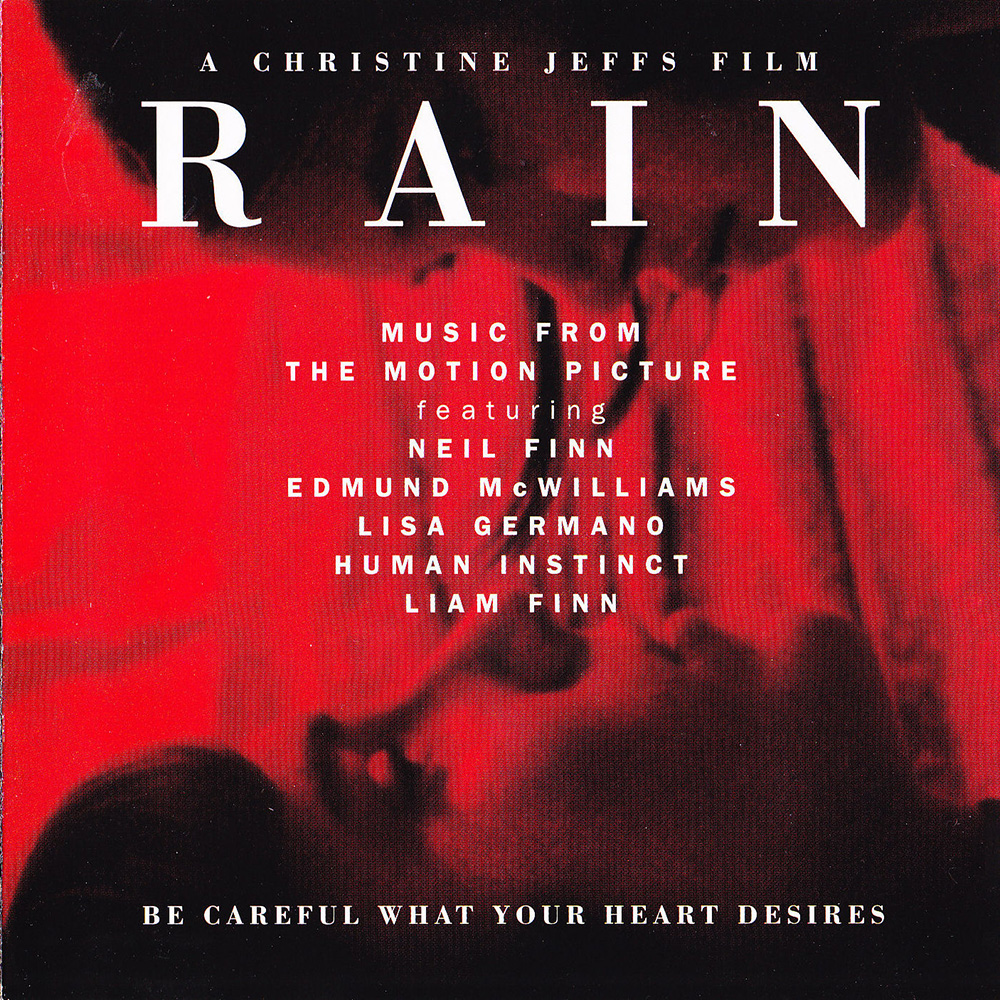
Rain – music by Neil Finn
 Neil Finn’s first foray into film scoring is an interesting mix of new songs and moody instrumental pieces. The songs and score tracks alternate for much of the CD, dividing things up nicely and creating quite a tapestry of different moods. “You Don’t Know” kicks things off with a dark, slinky feel and some outstanding vocal harmonies (not unlike the underrated Finn Brothers album), which brings me neatly to one other point – a lot of the vocal numbers on this soundtrack are almost “mini-songs,” very short in duration and sparse on lyrics (check out “Boat Joyride”, barely a minute long). “Summer Intro” quotes an infectious melody that later forms the basis of the song “Drive Home”, followed by “Summer Of Love”, a Finn/Edmund McWilliams collaboration on a song written by McWilliams. Again, vocal harmonies are to the fore. Elsewhere on the album, standouts include Lisa Germano’s “Cry Wolf” and her violin-driven instrumental “Phantom Love”, the eastern-influenced Finn instrumental “Red Room”, and another Finn/McWilliams collaboration, “Drive Home”, which is an instrumental for the first half of the song before the vocals ever kick in. Rounding things off is Neil’s son Liam Finn (of Betchadupa as well as his dad’s touring act) with “Lucid Dream”, an instrumental version of a song from the new Betchadupa album Alphabetchadupa. Perhaps the most out-of-place item here is a 1970 number from Human Instinct, a very, very Move-like late 60s/early 70s New Zealand rock group. In a way, it’s out of place for being the oldest song on the CD, but with the lo-fi production utilized on much of the soundtrack, it also fits in quite nicely, ironically enough.
Neil Finn’s first foray into film scoring is an interesting mix of new songs and moody instrumental pieces. The songs and score tracks alternate for much of the CD, dividing things up nicely and creating quite a tapestry of different moods. “You Don’t Know” kicks things off with a dark, slinky feel and some outstanding vocal harmonies (not unlike the underrated Finn Brothers album), which brings me neatly to one other point – a lot of the vocal numbers on this soundtrack are almost “mini-songs,” very short in duration and sparse on lyrics (check out “Boat Joyride”, barely a minute long). “Summer Intro” quotes an infectious melody that later forms the basis of the song “Drive Home”, followed by “Summer Of Love”, a Finn/Edmund McWilliams collaboration on a song written by McWilliams. Again, vocal harmonies are to the fore. Elsewhere on the album, standouts include Lisa Germano’s “Cry Wolf” and her violin-driven instrumental “Phantom Love”, the eastern-influenced Finn instrumental “Red Room”, and another Finn/McWilliams collaboration, “Drive Home”, which is an instrumental for the first half of the song before the vocals ever kick in. Rounding things off is Neil’s son Liam Finn (of Betchadupa as well as his dad’s touring act) with “Lucid Dream”, an instrumental version of a song from the new Betchadupa album Alphabetchadupa. Perhaps the most out-of-place item here is a 1970 number from Human Instinct, a very, very Move-like late 60s/early 70s New Zealand rock group. In a way, it’s out of place for being the oldest song on the CD, but with the lo-fi production utilized on much of the soundtrack, it also fits in quite nicely, ironically enough.
It’s important to point out that, unlike film or stage music by, oh, say, Peter Gabriel, the soundtrack from Rain is not a wasteland of previously-released material minus the vocals. Liam’s singular contribution aside, Neil Finn’s material is all-original here. The only thing it references is other tracks on this album – and last time I checked, that’s called a theme, something which comes in mighty handy  when you’re doing music for a movie or a TV show.
when you’re doing music for a movie or a TV show.
Overall, it’s quite an effective freshman film music outing, one that makes me hope Neil Finn might try this again sometime – just so long as he keeps turning out his own music as well instead of, oh, say, spacing solo albums ten years apart from each other.
- You Don’t Know – Neil Finn (song) (2:55)
- Summer Intro – Neil Finn (score) (1:39)
- Summer Of Love – Neil Finn & Edmund McWilliams (song) (2:52)
- Mum In Bed – Neil Finn (score) (0:57)
- Orange And Blue – Neil Finn (song) (2:29)
- Red Room – Neil Finn (score) (3:05)
- Cry Wolf – Lisa Germano (song) (4:57)
- The Affair – Neil Finn (score) (3:41)
- Black Sally – Human Instinct (song) (6:35)
- Boat Dawn – Neil Finn (score) (1:17)
- Boat Joyride – Neil Finn (song) (1:01)
- Kids Floating – Neil Finn (score) (1:09)
- Batman – Neil Finn (score) (1:59)
- Shower – Neil Finn (score) (1:35)
- Phantom Love – Lisa Germano (score) (3:22)
- Drive Home – Neil Finn & Edmund McWilliams (song) (5:39)
- Lucid Dream – Liam Finn (song) (4:17)
Released by: EMI New Zealand
Release date: 2002
Total running time: 49:29
Depeche Mode – Exciter
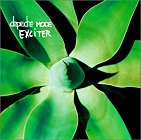 I’ll admit it upfront: Depeche Mode lost me for the longest time. I wasn’t the biggest fan of Violator, though there was stuff to like on that album. But it was the group’s 90s output – especially Ultra – that had me tuning them out. But at the risk of sounding a little too cheesy, I found Exciter much more exciting. This album sees Depeche Mode – and specifically core members David Gahan and Martin Gore – on the rebound from some of the events that helped the group hit that low ebb.
I’ll admit it upfront: Depeche Mode lost me for the longest time. I wasn’t the biggest fan of Violator, though there was stuff to like on that album. But it was the group’s 90s output – especially Ultra – that had me tuning them out. But at the risk of sounding a little too cheesy, I found Exciter much more exciting. This album sees Depeche Mode – and specifically core members David Gahan and Martin Gore – on the rebound from some of the events that helped the group hit that low ebb.
Gore’s songwriting acumen, which seemed to be on the decline, is back in full force with a number of fascinating and listenable tunes. And it helps that Gahan is back in fine form (and even better voice) for the first time since Violator. Normally I point out standout tracks, but the truth is, there’s little on Exciter to not enjoy. My personal favorites, however, have to be the dreamy “Comatose” – replete with the kind of mesmerising chords and structure that haven’t been a mainstay of the pop music landscape for decades, only with an updated sound and some of the best Gahan/Gore vocal harmonies ever – and the bouncy and slightly sarcastic “I Feel Loved”. Other highlights include the slinky Breathe and a thundering anthem to the goth generation, “The Dead Of Night”.
Overall, I’m thrilled with Exciter – this is the best thing Depeche Mode has done in  years. When they started out, they were mavericks on the pop scene, abandoning any sign of traditional instrumentation for the innovative sounds they could coax out of the then-new synths and samplers available in the new wave days. Even though that field’s pretty crowded now, Depeche Mode surprised me with this album, which shows they’re still the innovators they were twenty years ago.
years. When they started out, they were mavericks on the pop scene, abandoning any sign of traditional instrumentation for the innovative sounds they could coax out of the then-new synths and samplers available in the new wave days. Even though that field’s pretty crowded now, Depeche Mode surprised me with this album, which shows they’re still the innovators they were twenty years ago.
- Dream On (4:19)
- Shine (5:32)
- The Sweetest Condition (3:42)
- When The Body Speaks (6:01)
- The Dead Of Night (4:50)
- Lovetheme (2:02)
- Freelove (6:10)
- Comatose (3:20)
- I Feel Loved (4:20)
- Breathe (5:17)
- Easy Tiger (2:05)
- I Am You (5:10)
- Goodnight Lovers (3:48)
Released by: Warner Bros.
Release date: 2001
Total running time: 56:48
The Simpsons: Songs In The Key Of Springfield
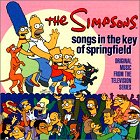 I’ll admit, I’m less of a Simpsons fan than I once was. Why, I remember working at a Fox station back in the days when the Simpsons were on once a week, years before you could see it at least twice a day in syndication. The Simpsons and I go back a long way.
I’ll admit, I’m less of a Simpsons fan than I once was. Why, I remember working at a Fox station back in the days when the Simpsons were on once a week, years before you could see it at least twice a day in syndication. The Simpsons and I go back a long way.
There have been three official Simpsons CDs thus far, and this is the only one that I’ve bothered with. Why? Because this one is a celebration of the music from the show itself, not some spinoff project (i.e. “Do The Bartman”) which was shoehorned back into the show itself. This CD is jam-packed with the original cast recordings, all backed by Alf Clausen’s brilliant musical scoring. As much as I may respect the work of latter-day cartoon tunesmiths like Richard Stone, I think it’s fair to say that Alf Clausen may be the worthiest descendant of the legacy of Carl Stalling. The similarities are numerous: an encyclopedic knowledge of musical pop culture references, a no-boundaries approach to arrangement and drastic re-arrangement, and an appreciation for just about every musical style under the sun.
Higlights include a medley from “Bart Sells His Soul” (featuring one of my all-time favorite moments from the series, in which Bart has subsituted his church’s hymnal sheet music with “In A Gadda Da Vida”), the bizarre, showstopping numbers from Springfield’s own stage musical version of Planet Of The Apes, and “We Do (The Stonecutters’ Song)” featuring none other than Patrick Stewart. The Itchy & Scratchy Theme is also included, as well as at least a dozen different specialty end-credit theme arrangements, spanning the musical spectrum from a Hill Street Blues pastiche to a spot-on homage to John Williams’ music from Oliver Stone’s JFK. The guest artists on here are stellar – Tony Bennett and the late Tito Puente, for cryin’ out loud – and there are numerous guest voices as well,  including Jeff Goldblum, Beverly D’Angelo, and the sorely missed Phil Hartman.
including Jeff Goldblum, Beverly D’Angelo, and the sorely missed Phil Hartman.
I may never buckle down and get the Simpsons on DVD, but that’s okay – some of my favorite scenes from the show are immortalized here, and unlike trying to plow through any given whole season of episodes, there isn’t a clunker anywhere in the bunch. Bravo!
- The Simpsons Main Title – Extended version (1:38)
- We Do (The Stonecutters’ Song) (1:18)
- Dancin’ Homer (1:43)
- Homer & Apu (1:56)
- ‘Round Springfield (2:55)
- Oh, Streetcar! – The Musical (4:03)
- Jingle Bells (0:45)
- Springfield Medley (0:54)
- Itchy & Scratchy Main Title (0:23)
- Itchy & Scratchy End Credits (0:17)
- The Day The Violence Died (1:50)
- Senor Burns (1:16)
- The Simpsons End Credits – Afro-Cuban version featuring Tito Puente (0:49)
- Your Wife Don’t Understand You (1:35)
- Kamp Krusty (2:19)
- The Simpsons End Credits – Australian version (0:53)
- The Simpsons End Credits – “Hill Street Blues” homage (0:47)
- The Simpsons End Credits – “It’s A Mad, Mad, Mad, Mad World” homage (0:49)
- Treehouse Of Horror V (1:22)
- Honey Roasted Peanuts (1:01)
- Boy Scoutz N The Hood (3:43)
- Two Dozen And One Greyhounds (1:59)
- “Eye On Springfield” Theme (0:47)
- Flaming Moe’s (1:01)
- Homer’s Barbershop Quartet (1:37)
- TV Sucks! (0:34)
- A Fish Called Selma (3:07)
- Send In The Clowns (1:06)
- The Monorail Song (1:50)
- In Search Of An Out Of Body Vibe (0:23)
- Cool (0:42)
- Bagged Me A Homer (2:18)
- It Was A Very Good Beer (0:39)
- Bart Sells His Soul (2:06)
- Happy Birthday, Lisa (1:20)
- The Simpsons Halloween Special End Credits – “Addams Family” homage (0:49)
- Who Shot Mr. Burns? Part One (0:55)
- Lisa’s Wedding (0:53)
- The Simpsons End Credits – “Dragnet” homage (1:05)
Released by: Rhino
Release date: 1998
Total running time: 55:55
Steve Winwood – Talking Back To The Night
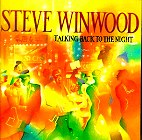 In 1980, Steve Winwood carved out a persistent niche of the radio airwaves with several tunes from his Arc Of A Diver album – and that niche was well-deserved, given Winwood’s synth-driven (but still more rock ‘n’ roll than new wave) distinctive sound. Sadly, the follow-up to that, while it did yield hits of its own, lacked the “oomph” of Arc‘s originality; if anything, it smacks in a few places of reheated leftovers.
In 1980, Steve Winwood carved out a persistent niche of the radio airwaves with several tunes from his Arc Of A Diver album – and that niche was well-deserved, given Winwood’s synth-driven (but still more rock ‘n’ roll than new wave) distinctive sound. Sadly, the follow-up to that, while it did yield hits of its own, lacked the “oomph” of Arc‘s originality; if anything, it smacks in a few places of reheated leftovers.
If anyone remembers one song off of Talking Back To The Night, it’s bound to be Valerie, a great song with a soaring DX-7 synth solo and some much-misheard lyrics. I never have gotten around to liking “Big Girls Walk Away” in the 20 years I’ve had to listen to it. The title track is a virtual carbon copy of Arc Of A Diver‘s lengthy “Night Train” single (a favorite of disc jockeys in gastric distress everywhere). The real gems aside from “Valerie” are “Still In The Game” and the joyful little number called “Help Me Angel”,  which has a chord progression that just gives me a good feeling.
which has a chord progression that just gives me a good feeling.
A mixed bag, but with the exception of “Still In The Game”, the good parts later appeared on Winwood’s Chronicles compilation, saving me the trouble of having to hear the rest of Talking Back To The Night again just to hear the good songs.
- Valerie (4:05)
- Big Girls Walk Away (3:51)
- And I Go (4:12)
- While There’s A Candle Burning (3:11)
- Still In The Game (4:51)
- It Was Happiness (4:58)
- Help Me Angel (5:08)
- Talking Back To The Night (5:44)
- There’s A River (4:40)
Released by: Island
Release date: 1982
Total running time: 40:50
U2 – All That You Can’t Leave Behind
 After losing me as a regular listener for most of the 90s (and y’know, I’m sure that loss just crushed the lads), U2 got me back on board with All That You Can’t Leave Behind. Returning to the compelling style of music that won them such an ardent fan base in the 1980s, U2 ditches some of the electronic production wizardry that drove some of us away in the next decade. And the result is a lovely thing to hear.
After losing me as a regular listener for most of the 90s (and y’know, I’m sure that loss just crushed the lads), U2 got me back on board with All That You Can’t Leave Behind. Returning to the compelling style of music that won them such an ardent fan base in the 1980s, U2 ditches some of the electronic production wizardry that drove some of us away in the next decade. And the result is a lovely thing to hear.
Sure, there are some revisitations to the 90s style (“Elevation” springs instantly to mind here), but for the most part U2 opts to let the simple beauty of the songs themselves shine through. “Stuck In A Moment” is a lovely ballad, “Wild Honey” is an almost folksy affair compared to the band’s usual output, and “Walk On” and “Beautiful Day” are a glorious return to that distinctly anthemic flavor of rock that caught everyone’s attention way back when on Unforgettable Fire.
The two songs that always stop me dead in my tracks, though, are “In A Little While” and “Kite”, two marvelous slow numbers that move along with a majestic gait and a combination of excellent lyrics and amazing musicianship. “In A Little While” in particular features some of Edge’s best guitar work (though it’s very simple and almost acoustic-sounding in places), and some of the sweetest notes ever to sneak out of Bono’s throat.  The soaring chorus is instant classic sing-along material, even if you, like me, can’t really even try to hit those notes.
The soaring chorus is instant classic sing-along material, even if you, like me, can’t really even try to hit those notes.
Stellar stuff from a band that, contrary to what I believed ten years ago, really has stood the test of time quite well.
- Beautiful Day (4:09)
- Stuck In A Moment (4:32)
- Elevation (3:47)
- Walk On (4:56)
- Kite (4:26)
- In A Little While (3:39)
- Wild Honey (3:46)
- Peace On Earth (4:48)
- When I Look At The World (4:16)
- New York (5:29)
- Grace (5:31)
Released by: Interscope
Release date: 2000
Total running time: 49:42
Command & Conquer: Red Alert
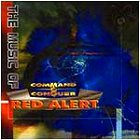 Another blast of raw energy from the other C&C music factory, Frank Klepacki’s music from the immensely popular Red Alert PC strategy game brings into sharp focus the elements that made his music from Command & Conquer such a compelling listen even away from the computer. Gone are most of the soundbytes within the music (the chilling refrain of film-footage “sieg heil” samples in “Hell March” being an exception), Klepacki brings in da funk in full force. “Mud” is perhaps the best example of what he achieves with the music from this game: funky, atmospheric, moody, and rhythmic, without relying on a hit-you-over-the-head-with-it, four-beats-to-the-measure techno beat at all times.
Another blast of raw energy from the other C&C music factory, Frank Klepacki’s music from the immensely popular Red Alert PC strategy game brings into sharp focus the elements that made his music from Command & Conquer such a compelling listen even away from the computer. Gone are most of the soundbytes within the music (the chilling refrain of film-footage “sieg heil” samples in “Hell March” being an exception), Klepacki brings in da funk in full force. “Mud” is perhaps the best example of what he achieves with the music from this game: funky, atmospheric, moody, and rhythmic, without relying on a hit-you-over-the-head-with-it, four-beats-to-the-measure techno beat at all times.  Though further games (and soundtracks) in the Command & Conquer series were released, their music seldom got better than this.
Though further games (and soundtracks) in the Command & Conquer series were released, their music seldom got better than this.
Though it was offered on Westwood Studios’ site for a long time, The Music Of Command & Conquer: Red Alert is now out of print.
- Hell March (6:24)
- Radio (4:05)
- Crush (3:49)
- Roll Out (3:54)
- Mud (4:48)
- Twin Cannon (3:55)
- Face The Enemy (5:36)
- Run (5:13)
- Terminate (5:20)
- Big Foot (5:15)
- Workmen (4:44)
- Militant Force (1:50)
- Dense (5:02)
- Vector (4:18)
- Smash (8:07)
Released by: Westwood Studios / Electronic Arts
Release date: 1996
Total running time: 72:20
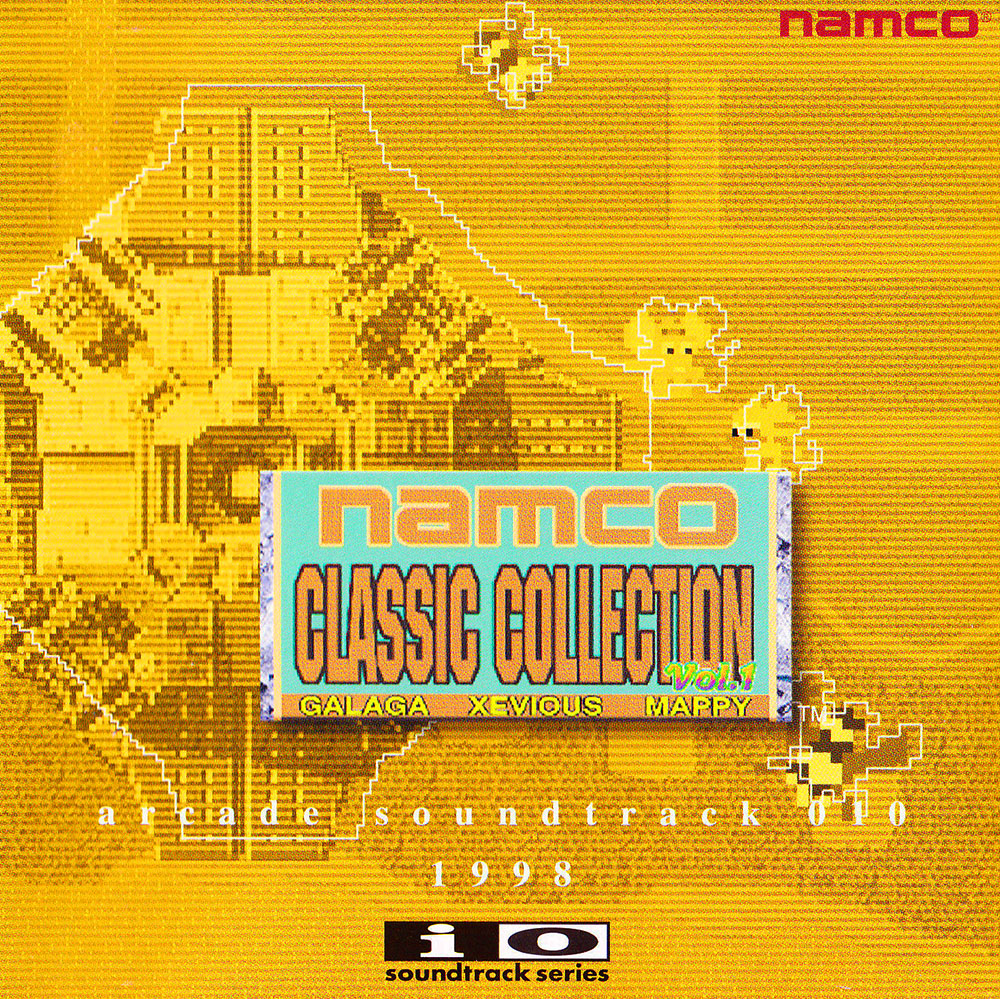
Namco Classic Collection Volume 1
Think of it as the Star Trek sound effects CD for computer game fanatics; Namco Classics Collection Vol. 1 (no relation to the Namco Classics remix CD by Techno Maniax reviewed here earlier) is the soundtrack – such as it is – to a multi-game coin-op which includes three of the company’s vintage video game chestnuts, Galaga, Mappy and Xevious, each in both their original and updated “Arrangement” versions. The Arrangement tracks tend to rehash the music of the original games with a more modern sound (though not too modern), and are actually neat; and having heard it many a time while playing one of the  bonus games on Xevious 3-D/G+, I can vouch for the unmatched low-key cool of Xevious Arrangement‘s level 1 background music.
bonus games on Xevious 3-D/G+, I can vouch for the unmatched low-key cool of Xevious Arrangement‘s level 1 background music.
Nice stuff, and flawlessly captured on disc, but really only for the faithful and devoted fans of “the oldies.”
- Classics Starting Over (0:06)
- Classics Opening (0:35)
from Galaga
- Kurejitto Oto (0:05)
- Geimu Staato Myuujikku (0:09)
- Ekusutendo Oto (0:05)
- Charenjingu Steiji Staato Myuujikku (0:05)
- Charenjingu Steiji Paafekuto Myuujikku (0:09)
- Charenjingu Steiji Nonpaafekuto Myuujikku (0:10)
- Maishippu Tsurasarare Oto (0:15)
- Maishippu Torikaeshi Oto (0:05)
- Kyaputibu Gosha Oto (0:15)
- Haiscoa Neimu Ire Myuujikku (0:27)
- Neimu Ire Myuujikku (0:21)
- Insert Coin! (0:06)
- Game Start (0:10)
- Stage Indication (0:04)
- BGM: Stage 1 (1:04)
- BGM: Stage 2 (1:08)
- BGM: Stage 3 (1:02)
- BGM: Stage 4 (1:10)
- BGM: Stage 5 (1:15)
- BGM: Stage 6 (1:05)
- BGM: Challenging Stage (0:47)
- BGM: Challenging Stage Clear! (0:09)
- BGM: Final Stage (1:15)
- BGM: Indicating Your Score (0:10)
- BGM: Hi Score Name Entry (0:20)
- BGM: Name Entry (0:22)
- BGM: Continue (0:25)
- BGM: Game Over (0:20)
- BGM: Ending (1:18)
from Xevious
- Kurejitto Oto (0:05)
- Staato Myuujikku (0:07)
- Geimu BGM (0:24)
- Ekustendo Oto (0:05)
- Ikurai Neimu Ire Myuujikku (0:19)
- Ikurai Neimu Ire Myuujikku (0:28)
- BGM 1 (4:35)
- BGM 2 (4:25)
- BGM 3 (3:50)
- BGM 4 (1:34)
- Staato Mae Manga BGM (0:07)
- Kurejitto Oto (0:04)
- Mein BGM (1:11)
- Ekusutendo Myuujikku (0:05)
- Mein BGM (Hurry Up!) (0:54)
- Raundo Kuria Myuujikku (0:06)
- Boonasu Raundo Staato Myuujikku (0:06)
- Boonasu Raundo BGM (0:40)
- Boonasu Raundo Oobaa Myuujikku (0:13)
- Misu Oto (0:05)
- Neimu Ire Myuujikku (0:36)
- Neimu Ire Shuuryou Myuujikku (0:14)
- Geimu Oobaa Myuujikku (0:12)
- Insert Coin! (0:04)
- Game Start! (0:08)
- BGM: Area 1 (1:42)
- Round Clear! – Area 1 (0:05)
- BGM: Area 2 (2:06)
- Round Clear! – Area 2 (0:06)
- BGM: Area 3 (1:54)
- Round Clear! – Area 3 (0:06)
- BGM: Area 4 (2:01)
- Round Clear! – Area 4 (0:05)
- BGM: Area 5 (2:27)
- Round Clear! – Area 5 (0:05)
- BGM: Area 6 (2:11)
- Round Clear! – Area 6 (0:06)
- Opening Fanfare! – Bonus Round (0:04)
- BGM: Bonus Round (0:43)
- Result – Bonus Round (0:14)
- Winner’s Fanfare – Bonus Round (0:04)
- BGM: Boss Round (1:24)
- BGM Hurry Up! Boss Round (0:33)
- Round Clear! Boss Round (0:06)
- BGM: Oops! I Missed! (0:06)
- BGM: Game Over (0:11)
- BGM: Continue (0:35)
- BGM: Name Entry (1:36)
- BGM: Name Entry Over (0:14)
- BGM: Ending (1:25)
Released by: Wonder Spirits
Release date: 1998
Total running time: 56:18
Crouching Tiger, Hidden Dragon – music by Tan Dun
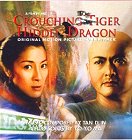 At some point, I really need to review this movie for you if you haven’t seen it. Go ahead and rent it sometime between now and then, as I’m not going to spoil the plot for you in a music review. I am going to talk about the music, though, if you don’t mind.
At some point, I really need to review this movie for you if you haven’t seen it. Go ahead and rent it sometime between now and then, as I’m not going to spoil the plot for you in a music review. I am going to talk about the music, though, if you don’t mind.
I love the music from Crouching Tiger, Hidden Dragon. There. Short review, eh?
Okay, not so fast. Sit back down. Let me tell you why. Apart from boasting some of the most elaborate “flying fighting” sequences committed to film in recent years, Crouching Tiger also has a surprisingly romantic element to it, and the music serves both well – by staying low and letting the visuals be the fireworks.
When you’ve got people flying on wires and somehow managing to tiptoe through treetops that couldn’t possibly support their weight, and fighting all the while, let’s face it – big, brassy John Williams-style music would likely evoke a smirk at the very least from the audience. Chinese composer Tan Dun wisely drenches the entire film with a more low-key, mystic sound, which imbues a potentially silly sight with a more magical  feel. In short, where the visual impact of these scenes could have been silly, the music salvages things nicely. (Isn’t that what film music is for?)
feel. In short, where the visual impact of these scenes could have been silly, the music salvages things nicely. (Isn’t that what film music is for?)
Special mention also has to be made of the awesome display of percussive force that is “Night Fight” – I can say nothing else here that would do it justice.
- Crouching Tiger, Hidden Dragon (3:23)
- The Eternal Vow (3:01)
- Wedding Interrupted (2:15)
- Night Fight (3:09)
- Silk Road (3:11)
- To The South (3:20)
- Through The Bamboo Forest (4:21)
- The Encounter (2:39)
- Desert Capriccio (4:32)
- In The Old Temple (3:45)
- Yearning Of The Sword (3:33)
- Sorrow (4:01)
- Farewell (2:24)
- A Love Before Time – English (3:42)
- A Love Before Time – Mandarin (3:40)
Released by: Sony
Release date: 2000
Total running time: 49:56
Neil Finn – One All
 Some of us self-confessed pop music addicts are so gaga over just about anything by the Finn Brothers that we’ll plunk down thirty bucks to import an album that appears to have no chance of arriving on store shelves in America. And that was the case when I got One Nil, the second solo album by Neil Finn. And while my music-buying budget isn’t that big, $30 is worth it for a finely crafted album like One Nil.
Some of us self-confessed pop music addicts are so gaga over just about anything by the Finn Brothers that we’ll plunk down thirty bucks to import an album that appears to have no chance of arriving on store shelves in America. And that was the case when I got One Nil, the second solo album by Neil Finn. And while my music-buying budget isn’t that big, $30 is worth it for a finely crafted album like One Nil.
One All, on the other hand, is the American version of the album, arriving a year later, subtracting two songs (both of which I liked a lot) and adding two more (both of which I like a lot). Why any tracks had to be deleted, I’ll never know, but Finn himself made that decision. He also had several of the surviving One Nil tracks remixed by Bob Clearmountain (who did so much to make Crowded House’s Together Alone album the masterpiece of atmosphere that it was), and changed the running order a bit.
The result is a nice album, but one which may now be missing its emotional core. One All is still, like its original version, largely about fidelity in a relationship, but the addition of the lovely “Lullaby Requiem” (possibly the most tragically beautiful pop song I’ve ever heard) and the quirky “Human Kindness” jars that running theme a bit. Even more than that, the absence of “Elastic Heart” – an abstract, atmospheric song about anger and forgiveness and stretching a relationship to its limits – damages whatever flow One All might’ve had even with the two new songs. I know “Elastic Heart” was probably a song that most listeners considered “weird,” but I grew to like its unusual melancholy brass-band ambience and especially its lyrics. I miss its presence here.
 Overall, however, my reaction is one of relief that the album has been released in the U.S. in any form at all. I have a few minor gripes about the remixing done on some of the songs (I actually preferred the moody and sometimes murky mixing of the songs in their original One Nil form), but the songs themselves are still worth the price tag.
Overall, however, my reaction is one of relief that the album has been released in the U.S. in any form at all. I have a few minor gripes about the remixing done on some of the songs (I actually preferred the moody and sometimes murky mixing of the songs in their original One Nil form), but the songs themselves are still worth the price tag.
- The Climber (4:15)
- Driving Me Mad (3:56)
- Hole In The Ice (4:06)
- Last To Know (2:59)
- Wherever You Are (4:42)
- Secret God (5:24)
- Lullaby Requiem (3:44)
- Human Kindness (4:41)
- Turn And Run (3:41)
- Anytime (3:23)
- Rest Of The Day Off (3:57)
- Into The Sunset (4:12)
Released by: Nettwerk America
Release date: 2002
Total running time: 49:00
The Tripods – music by Ken Freeman
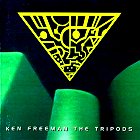 Debuting in the 18-month gap between Doctor Who’s 22nd and 23rd seasons, The Tripods was the BBC’s adaptation of John Christopher’s trilogy of children’s novels about a group of young people joining up with rebels in the fight to rid Earth of an alien race which has enslaved humanity. In many ways, The Tripods fared little better than the show it had been intended to replace – it got cancelled after a second season, leaving the show in a permanent major cliffhanger (which itself seems to be something of a BBC science fiction tradition, just ask any Blake’s 7 fan) when the adaptation of the third book was cancelled. Still, both the books and the 25-episode television series left behind a strong cult following. One of the products of that following is this soundtrack collection, consisting of a full-length CD and two CD singles with dance-oriented remixes of the show’s theme and assorted incidental cues.
Debuting in the 18-month gap between Doctor Who’s 22nd and 23rd seasons, The Tripods was the BBC’s adaptation of John Christopher’s trilogy of children’s novels about a group of young people joining up with rebels in the fight to rid Earth of an alien race which has enslaved humanity. In many ways, The Tripods fared little better than the show it had been intended to replace – it got cancelled after a second season, leaving the show in a permanent major cliffhanger (which itself seems to be something of a BBC science fiction tradition, just ask any Blake’s 7 fan) when the adaptation of the third book was cancelled. Still, both the books and the 25-episode television series left behind a strong cult following. One of the products of that following is this soundtrack collection, consisting of a full-length CD and two CD singles with dance-oriented remixes of the show’s theme and assorted incidental cues.
The main CD itself is a magnificent thing to hear, starting with the incredibly moody theme tune. Foreboding and spooky, the theme from The Tripods still manages to evoke a noble sense of hope, particularly with regard to the version used over the end credits which had more of a stately, march-like rhythm. The first time I ever saw The Tripods, the theme music instantly etched itself into my brain and I have never forgotten it. It’s nice to have it on CD at last, and also in remixed form, about which more in a moment.
The incidental cues that make up the bulk of the full-length CD lean heavily on some stellar synth work from Freeman (who invented his own music synthesizer while in his teens). In a way, this music can sit comfortably alongside the equally memorable analog synth scoring of Doctor Who in the early 80s – stylistically speaking. The music from The Tripods came several years later, and is one of the earliest things anyone ever heard coming out of a Synclavier. Its sweep is majestic and cinematic, and its scary moments are truly terrifying. Freeman managed to coax some disquietingly unearthly sounds out of the Synclavier, especially for the penultimate track, “Embers Of The Freemen” (which also happens to be the cue leading up to the series’ rather unfortunate cliffhanger ending). Early on, there’s some nice acoustic guitar work as well, and the music itself seems to take a journey along with its trio of youthful adventurers, from innocence to a determined but most likely doomed struggle for the freedom of the human race.
 The two remix CDs are very short – CD-single short – but they do manage to revisit key moments of the soundtrack in interesting ways. One of the main theme remixes smacks mightily of “Flight Of The Phoenix” and wouldn’t be out of place on the dance floor. I like the remixes, but there’s nothing like that end credit music in its pure, un-messed-with form.
The two remix CDs are very short – CD-single short – but they do manage to revisit key moments of the soundtrack in interesting ways. One of the main theme remixes smacks mightily of “Flight Of The Phoenix” and wouldn’t be out of place on the dance floor. I like the remixes, but there’s nothing like that end credit music in its pure, un-messed-with form.
- Main Theme (2:53)
- Ozymandias (0:54)
- The Journey Begins (1:29)
- Paris, 2089 (1:33)
- The Storm (1:43)
- Chateau Ricordeau (2:55)
- Eloise: Queen Of The Tournament (2:13)
- Riding Into The Night (2:42)
- The Reunion (1:35)
- Vichots Vineyard (4:08)
- The Chase (4:40)
- Daniel (4:07)
- Across The Plains (1:19)
- Trapped In The Gulley (2:13)
- Capture (1:30)
- United With The Freemen (3:01)
- The White Mountain Suite (5:50)
- Pierre (3:28)
- Race For The Erlkonig (2:27)
- Commandant Goetz (2:19)
- The City Of Gold (2:41)
- The Power Elite (2:38)
- The Cognosc Departs (2:20)
- Escape From The City (3:38)
- Rescue At The River (3:53)
- Trapped At The Ruined House (1:58)
Embers Of The Freemen (1:50)
- Closing Theme (2:42)
Tripods: The Remix
- The Tripods Main Theme: Revolution (2:51)
- The Tripods Main Theme: Resolution (6:38)
- Escape From The City: Retribution (3:41)
- Ozymandias: Moonlight (7:46)
Tripods: Limited Edition Remix
- The Tripods Main Theme: Revelation (6:11)
- Eloise: Symphony (4:41)
- Ozymandias: Sunrise (6:33)
Released by: Gerry Forrester
Release date: 1995 (remix CDs released in 1997)
Total running time: 74:47
Remix CD total running time: 20:56
Limited Edition CD total running time: 17:25
Peter Gabriel – Up
 Peter Gabriel is such a busy performer, what with his occasional soundtrack songs (for such movies as Philadelphia and City Of Angels and his occasional soundtrack scoring (Long Walk Home, Birdy, Passion: Music For The Last Temptation Of Christ, etc.) and other projects which don’t quite qualify as solo albums (OVO). And it’s easy to forget, with all of that activity, that here we have a man who hasn’t really released a solo album in a decade. Let’s put that in perspective, shall we?
Peter Gabriel is such a busy performer, what with his occasional soundtrack songs (for such movies as Philadelphia and City Of Angels and his occasional soundtrack scoring (Long Walk Home, Birdy, Passion: Music For The Last Temptation Of Christ, etc.) and other projects which don’t quite qualify as solo albums (OVO). And it’s easy to forget, with all of that activity, that here we have a man who hasn’t really released a solo album in a decade. Let’s put that in perspective, shall we?
- When Us was released, I was still working part-time in radio.
- When Us was released, the fifth season of Star Trek: The Next Generation was still on the air, and it was still the only Star Trek series on TV. No one had ever heard of Babylon 5 or Xena.
- When Us was released, the Persian Gulf War had been over for a year – or so many of us thought.
- When Us was released, Britney Spears was still on the New Mickey Mouse Club, and Toad The Wet Sprocket was actually getting radio airplay.
- When Us was released, I was in my 20s, not my 30s.
Now, bearing in mind that Up has been “just around the corner” since 1998 or so, there’s a certain anticipation factor at work here as well. Given that Pete’s soundtrack work in the past decade or so has been exceptional, most of his fans were eager to hear what it would be like when the man would actually open his mouth and sing again.
Up was either going to be nothing short of a spiritual revelation, or a total disappointment.
Actually, it’s neither – it’s a good album, certainly, but in some ways Gabriel has yet to match the diversity and virtuosity of 1986’s So, the album which put him on the charts with “Big Time” and “Sledgehammer”. There’s a certain introspective murkiness that has dominated Gabriel’s work, both solo and theatrical, since 1989’s Passion, which was the project where he fell in love with Mediterranean soundscapes and instruments. There’s nothing wong with that, but sometimes that atmosphere just doesn’t lend itself to a great pop song like “Big Time”.
Up opens with “Darkness”, which smacks mightily of the first song on his third self-titled album. Almighty searing blasts of distorted guitar belie the song’s true nature, which gets much quieter as it goes on despite a paranoid lyric that made sense with the blasting intro of the song. Things get a little more lively with the outstanding “Growing Up”, which is a complex, jumpy tune in which two or three simultaneous lyrics occasionally overlap, especially in the last verse of the song.
“Sky Blue” is a quiet, ambient number (featuring guitars by none other than Peter Green) which had already been heard to a certain extent – a few tracks on Gabriel’s soundtrack project Long Walk Home previewed the awesomely atmospheric backing vocals of the Blind Boys Of Alabama, though here the power of those vocals is somewhat diminished. I can’t really explain, but on Long Walk Home, the Blind Boys came out of nowhere and made a quiet little cue a show-stopper; here, they’re just echoing a melody that Gabriel’s been singing throughout the song.
“No Way Out” is another quiet song with an alarming and arresting lyric – the simplest interpretation of which is that someone standing next to the person singing the song has been shot – featuring former Crowded House producer Mitchell Froom on piano and Gabriel himself on guitar (I could be wrong, but I don’t think I’ve ever seen or heard of Pete playing guitar). Froom’s presence is no surprise, as the entire album is mixed by Tchad Blake, who also lent a lot of atmosphere to the latter Crowded House albums.
The next track, however, makes “Sky Blue”‘s recycling of vocals pale in comparison: “I Grieve”, though a nice song (which almost feels like two wildly different songs glued together), was heard two or three years ago on the City Of Angels soundtrack. If anything, this is my biggest beef with Up – I was hoping to hear completely new material. “Sky Blue” I can handle – it was previewed on a soundtrack mere months before Up‘s release – but “I Grieve” is a few years older than that.
“The Barry Williams Show”, a slightly dated pop number whose lyrics address Jerry Springer/Maury Povich-esque talk shows, has already been widely heard as the album’s lead single. It’s probably the most radio-ready song on the album, but its subject matter has passed its sell-by date, and one wonders how long ago it was written. Maybe around the same time as “I Grieve”.
The next four songs may be the most interesting stuff on the entire album: “My Head Sounds Like That” (guest starring the uniquely spare brass sound of the Black Dyke Band, which made OVO‘s “Father, Son” the sentimental tear-jerker that it is), more of the Blind Boys of Alabama on the upbeat “More Than This” (not a remake of the Bryan Ferry song of the same name), the epic orchestral grandeur of “Signal To Noise”, and the brief and surprisingly quiet closing number, “The Drop”. The last of these four is quite a shocker compared to the rest of the album, as it primarily features Gabriel’s untreated voice accompanied by an untreated solo piano (there are some other ambient-ish sounds in the mix too, but they’re way down in the mix).
“Signal To Noise” features the wailing vocals of guest Nusrat Fateh Ali Khan, the strings of the London Session Orchestra, and the thundering wall of sound of the Dhol Foundation Drummers, but while the guest performers and the arrangement are very impressive, the basic melody itself and the sparse lyrics are almost like something out of Gabriel’s second or third album; it’s a simple song, nicely dressed up. And speaking of guest performers, I couldn’t help but notice that Jon Brion got a credit in “More Than This” – seems that even though he can’t get a major label to release that underrated (and finished) album of his, Brion’s getting plenty of attention from other musicians. That may be a higher compliment than record sales anyway.
 Overall, Up is yet another intense Peter Gabriel listening experience, but in some places it’s curiously lacking the heart of his earlier works. And I’ll admit, Gabriel’s increasing tendency to borrow from his own back catalogue is becoming worrisome – this coming from someone who’d prefer to hear new material when he plunks money down on the counter for a supposedly new CD. Still, I recommend it – perhaps Up will be an instance of an album that finds new fans for Gabriel rather than living up to the wishes of his established listeners.
Overall, Up is yet another intense Peter Gabriel listening experience, but in some places it’s curiously lacking the heart of his earlier works. And I’ll admit, Gabriel’s increasing tendency to borrow from his own back catalogue is becoming worrisome – this coming from someone who’d prefer to hear new material when he plunks money down on the counter for a supposedly new CD. Still, I recommend it – perhaps Up will be an instance of an album that finds new fans for Gabriel rather than living up to the wishes of his established listeners.
- Darkness (6:51)
- Growing Up (7:33)
- Sky Blue (6:31)
- No Way Out (7:53)
- I Grieve (7:24)
- The Barry Williams Show (7:16)
- My Head Sounds Like That (6:29)
- More Than This (6:02)
- Signal To Noise (7:36)
- The Drop (2:59)
Released by: Geffen
Release date: 2002
Total running time: 66:43
Space Battleship Yamato Part 2 – Hiroshi Miyagawa
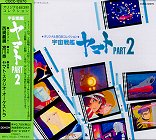 When Leiji Matsumoto’s epic space opera Space Battleship Yamato (later imported to the U.S. as Star Blazers) proved to be a success in Japan, the show’s landmark first season was rewritten and compressed into a movie with new (and, in many cases, improved) animation. The movie also went over well, so a second film was created, though it made the ill-advised move of killing off the entire crew of the Yamato in a fateful battle with the Comet Empire.
When Leiji Matsumoto’s epic space opera Space Battleship Yamato (later imported to the U.S. as Star Blazers) proved to be a success in Japan, the show’s landmark first season was rewritten and compressed into a movie with new (and, in many cases, improved) animation. The movie also went over well, so a second film was created, though it made the ill-advised move of killing off the entire crew of the Yamato in a fateful battle with the Comet Empire.
One little problem: that movie also went over well, creating even more of a demand. So the movie was rewritten and expanded into enough scripts to cover another season of the TV series, a season which left the crew alive at the end to continue their adventures on both the big and small screens.
This is the soundtrack to that movie, which was also used for the TV reworking of the story.
Now that the history lesson is out of the way, let’s talk music. There is a vast difference between this soundtrack and the soundtrack of the first season’s music in terms of both sound quality and, on a less technical level, the sophistication of the music itself.
Many of the same cues heard in season one were reused in season two, but the technical and musical improvements are perhaps most detectable in the recycled cues. “The Mystery Of Space” is a solemn variation on “The Universe Spreading To Infinity”, one of my favorite pieces from the original season one soundtrack. In this case, it underscores the Yamato’s crew gathering at a memorial for their fallen captain at Hero’s Hill. And the effect, even without the visuals is spectacular.
In other tracks that revamp season one’s signature themes, the overall effect is bigger and bolder – brassy cues blast even louder than they did originally, and the funky cues with rock instrumentation crank it up that much more in this recording. The larger orchestra used for these sessions almost has the same impact of the  excellent Symphonic Suite Yamato.
excellent Symphonic Suite Yamato.
Knowing in advance that Space Battleship Yamato Part 2 featured much music that had already been used in the first soundtrack, I didn’t expect to like it as much as I did. It’s both an excellent collection of music and a pleasant surprise.
- The Silence Of Space (1:04)
- The Mystery Of Space (1:45)
- Iscandar (1:43)
- The Universe Spreading To Infinity (1:05)
- Yamato’s Theme (1:28)
- Yamato Takes Flight! (1:30)
- Courageous Yamato (1:12)
- Yamato’s Battle (1:07)
- Wounded Yamato (0:59)
- Rise Up, Yamato! (0:45)
- Desler’s Bolero (1:04)
- Meditation (1:41)
- Desler’s Tactics (2:32)
- Complications (1:47)
- Imprisonment (0:44)
- The Rival I (3:00)
- Kodai And Dessler’s Friendship (1:27)
- The Rival II (1:22)
- Reminiscence (2:10)
- Menace In Space (1:49)
- Appearance And Attack (0:47)
- Comet Empire Fleet Sorties! (1:09)
- Battle Theme (1:18)
- Comet Empire Emperor Zordar (0:37)
- Great Love (1:58)
- Reunion (1:30)
- Thoughts Toward The Stars (1:00)
- Tears Of Love (0:47)
- Melody Of Love (1:58)
- Andromeda (1:30)
- Yamato Opening Theme (1:29)
- Yamato Reunion (2:03)
- Teresa’s Theme (1:15)
- Mystery Of Planet Telezart (0:43)
- Teresa’s Love Theme (2:20)
- Various Endings (3:40)
- The Scarlet Scarf (1:54)
Released by: Nippon Columbia
Release date: 1995
Total running time: 56:38
Jars Of Clay – The Eleventh Hour
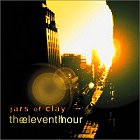 Still my favorite Christian rock act, Jars Of Clay’s fourth album sees them returning not only to the studio, but to the producer’s chair. Though I liked the stylistic stretches that it represented, not everyone dug If I Left The Zoo, with its almost Jellyfish-like experimentation with everything from bluegrass banjos to hard rock. That spirit of not sticking to the program, fortunately, survives through The Eleventh Hour with the hard-rocking “Revolution” (a smart song whose message is that if you really want to be a rebel, try being a decent person instead of trying to be a badass), and flirting with a latter-day R.E.M.-ish sound on “Silence”. The more traditional Jars Of Clay sound is still present too, with “Fly” and an alternate rock hit waiting to be discovered, “I Need You”. The band still excels at love songs which are neither sappy nor overly concerned with physical relations; they could be sung to the object of your affections as easily as they could be sung to Jesus – and that’s the beauty of it, because the latter is who the songs are
Still my favorite Christian rock act, Jars Of Clay’s fourth album sees them returning not only to the studio, but to the producer’s chair. Though I liked the stylistic stretches that it represented, not everyone dug If I Left The Zoo, with its almost Jellyfish-like experimentation with everything from bluegrass banjos to hard rock. That spirit of not sticking to the program, fortunately, survives through The Eleventh Hour with the hard-rocking “Revolution” (a smart song whose message is that if you really want to be a rebel, try being a decent person instead of trying to be a badass), and flirting with a latter-day R.E.M.-ish sound on “Silence”. The more traditional Jars Of Clay sound is still present too, with “Fly” and an alternate rock hit waiting to be discovered, “I Need You”. The band still excels at love songs which are neither sappy nor overly concerned with physical relations; they could be sung to the object of your affections as easily as they could be sung to Jesus – and that’s the beauty of it, because the latter is who the songs are  directed toward, but these songs could hit mainstream secular radio without sounding like Christian music.
directed toward, but these songs could hit mainstream secular radio without sounding like Christian music.
Though the entire album is excellent, the cluster of “Fly”, “I Need You” and “Silence” is one of the better three-song runs I’ve heard on anything I’ve listened to recently. But the entire CD is highly recommended.
- Disappear (3:56)
- Something Beautiful (3:46)
- Revolution (3:42)
- Fly (3:20)
- I Need You (3:40)
- Silence (5:17)
- Scarlet (3:32)
- Whatever She Wants (3:43)
- The Eleventh Hour (4:27)
- These Ordinary Days (3:04)
- The Edge Of Water (3:54)
Released by: Silvertone
Release date: 2002
Total running time: 42:21
Command & Conquer – music by Frank Klepacki
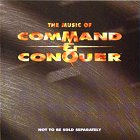 It may have been a little ahead of its time, but the soundtrack from Westwood’s acclaimed real-time strategy computer game Command & Conquer could almost earn the subtitle “music that could have been, but wasn’t, in The Matrix.” Frank Klepacki’s richly textured pieces rely heavily on techno, primarily because it’s easy to loop seamlessly (which is a requirement when scoring a video game). But while he could’ve just set the war machine on autopilot for these tracks, Klepacki made a real effort to vary the sound of each individual piece. Standouts include “Radio”, “Drone”, “Rain In The Night” and “Target”, all notable for a nice, uneasy but not overbearingly bombastic atmosphere, just the sort of doom-laden tension you need for a war game.
It may have been a little ahead of its time, but the soundtrack from Westwood’s acclaimed real-time strategy computer game Command & Conquer could almost earn the subtitle “music that could have been, but wasn’t, in The Matrix.” Frank Klepacki’s richly textured pieces rely heavily on techno, primarily because it’s easy to loop seamlessly (which is a requirement when scoring a video game). But while he could’ve just set the war machine on autopilot for these tracks, Klepacki made a real effort to vary the sound of each individual piece. Standouts include “Radio”, “Drone”, “Rain In The Night” and “Target”, all notable for a nice, uneasy but not overbearingly bombastic atmosphere, just the sort of doom-laden tension you need for a war game.
Klepacki leans very heavily on speech samples throughout the soundtrack, which is something I probably could have lived without; in a few tracks, such as “Just Do It Up” and “Act On Instinct”, the constant bits of movie dialogue, news clips and whatnot become a distraction against the music.
 Westwood sold copies of the Command & Conquer soundtrack through their web site for several years, and copies have also been known to be included with bundled versions of the game with its expansion packs (and, most recently, included in a music bundle at Best Buy stores with Red Alert 2). However, the C&C score is now out of print. It’s worth the effort to find, however, if you have a taste for this particular genre of music.
Westwood sold copies of the Command & Conquer soundtrack through their web site for several years, and copies have also been known to be included with bundled versions of the game with its expansion packs (and, most recently, included in a music bundle at Best Buy stores with Red Alert 2). However, the C&C score is now out of print. It’s worth the effort to find, however, if you have a taste for this particular genre of music.
- Act On Instinct (2:52)
- No Mercy (3:21)
- Industrial (2:53)
- Iron Fist (3:30)
- We Will Stop Them (3:09)
- Radio (3:01)
- On The Prowl (3:02)
- Re-Con (4:22)
- Drone (4:32)
- In The Line Of Fire (2:04)
- Prepare For Battle (3:29)
- Depth Charge (4:15)
- Rain In The Night (2:34)
- Creeping Upon (3:37)
- Target (2:52)
- Just Do It Up (2:22)
- C&C Thang (3:12)
- To Be Feared (2:45)
- Drill (4:27)
- Full Stop (3:01)
- In Trouble (3:32)
- Airstrike (3:17)
Released by: Westwood Studios / Electronic Arts
Release date: 1995
Total running time: 72:09
Taito Game Music
 When I first heard about this one, I was eager to get my hands on it, hoping it’d turn out to be something like the Namco Classic Collection remix album.
When I first heard about this one, I was eager to get my hands on it, hoping it’d turn out to be something like the Namco Classic Collection remix album.
Nope. This is just the game sound. And nothing more.
While that works for some games – Elevator Action had a jaunty tune or two, to say nothing of Bubble Bobble – who wants to sit and listen to an audio track of someone playing Space Invaders? Because that’s what you’ll hear on this disc – the unaltered, un-remixed sounds of the games themselves. And nothing more.
I can see classifying this as more of a sound effects CD than anything; might come in handy if they ever get around to turning “Joystick Nation” into that PBS miniseries they’ve been promising forever, or it might come in handy for any movies where a scene takes place in an arcade. But as a pure listening experience, it’s  daunting to look at a list of 69 tracks, knowing that there’s many a bleep and a boop in each one, and in some cases precious little music.
daunting to look at a list of 69 tracks, knowing that there’s many a bleep and a boop in each one, and in some cases precious little music.
Now, on the other hand, if a DJ wanted to take some of this stuff and sample it for their own remix…well, this CD would suddenly be beyond merely useful.
- The Legend Of Kage – BGM1 (2:20)
- The Legend Of Kage – BGM2 (0:49)
- The Legend Of Kage – Track 3 (0:58)
- Space Invaders – Playing Sound (0:17)
- Elevator Action – Track 1 (0:08)
- Elevator Action – Track 2 (1:28)
- Elevator Action – Track 3 (0:19)
- Super Dead Heat II – Track 1 (0:24)
- Super Dead Heat II – Track 2 (0:24)
- Super Dead Heat II – Track 3 (0:12)
- Super Dead Heat II – Level 1 (0:34)
- Super Dead Heat II – Level 2 (0:33)
- Super Dead Heat II – Level 3 (0:22)
- Super Dead Heat II – Level 4 (0:19)
- Super Dead Heat II – Level 5 (0:19)
- Super Dead Heat II – Level 6 (0:21)
- Super Dead Heat II – Level 7 (0:51)
- Super Dead Heat II – Level 8 (1:08)
- Super Dead Heat II – Track 12 (0:09)
- Super Dead Heat II – Track 13 (0:04)
- Super Dead Heat II – Track 14 (0:44)
- Wyvern F-0 – BGM: Codename Zero – Type I (1:11)
- Wyvern F-0 – BGM: Codename Zero – Type II (0:39)
- Wyvern F-0 – BGM: Count Zero (0:08)
- The Fairyland Story – Track 1 (0:04)
- The Fairyland Story – Track 2 (BGM) (1:26)
- The Fairyland Story – Track 3 (BGM) (0:32)
- The Fairyland Story – Track 4 (0:05)
- The Fairyland Story – Track 5 (0:05)
- The Fairyland Story – Track 6 (BGM) (0:40)
- The Fairyland Story – Track 7 (0:09)
- Gladiator – Playing Music (1:56)
- Kikikaikai – BGM1 (1:36)
- Kikikaikai – Boss (0:22)
- Kikikaikai – Track 3 (0:05)
- Kikikaikai – Track 4 (0:10)
- Kikikaikai – Track 5 (0:04)
- Kikikaikai – Track 6 (0:42)
- Kikikaikai – Track 7 (0:34)
- Scramble Formation – BGM1: Flying Alive (1:02)
- Scramble Formation – BGM2: Avoid Muzik (0:55)
- Scramble Formation – BGM: Dot Shooter (1:13)
- Scramble Formation – BGM3: Finale (0:32)
- Arkanoid – Track 1 (0:11)
- Arkanoid – Playing Sound (0:33)
- Arkanoid – Track 3 (0:14)
- Arkanoid – Track 4 (0:47)
- Chack’n Pop – Playing Sound (1:29)
- Chack’n Pop – Track 2 (0:30)
- Empire City 1931 – BGM1 (1:59)
- Empire City 1931 – BGM2 (1:06)
- Empire City 1931 – BGM3 (0:44)
- Empire City 1931 – BGM4 (0:51)
- Empire City 1931 – BGM5 (0:45)
- Empire City 1931 – BGM6 (0:08)
- Empire City 1931 – BGM7 (0:08)
- Empire City 1931 – BGM8 (0:35)
- Bubble Bobble – Track 1 (0:11)
- Bubble Bobble – Track 2 (0:49)
- Bubble Bobble – Track 3 (0:25)
- Bubble Bobble – Track 4 (0:29)
- Bubble Bobble – Track 5 (0:25)
- Bubble Bobble – Track 6 (0:04)
- Bubble Bobble – Track 7 (0:36)
- Halley’s Comet – Ed1986 (1:12)
- Halley’s Comet – Contact (0:32)
- Halley’s Comet – Mechanical Brains (1:13)
- Halley’s Comet – Track 4 (0:51)
- The Outer Zone – Outer Zone (2:33)
Released by: Sci-Tron Digital Content
Release date: 2002
Total running time: 46:46
Daniel Gannaway – Bound And Suburban
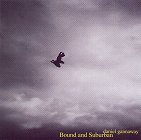 This appealing self-published entry from New Zealand singer/songwriter Daniel Gannaway may be a low-key winner, but it’s a winner nonetheless – actually, it’s one of the best things that I’ve heard so far this year. Predominantly a one-man-and-his-guitar album with some drum machine and the occasional overdubbed keyboards and backing vocals, Bound And Suburban benefits from some self-assured musicianship and an excellent lyrical sensibility. In some ways, the best thumbnail description I can offer to the uninitiated is a combination of the lo-fi cool of the Finn Brothers or Sunglass and the hard-to-describe but distinct sound of the world-weary Celtic minstrel. Gannaway isn’t afraid to wax modern on several tracks either, with “Y’Hold My Court” standing out as a fine example of this.
This appealing self-published entry from New Zealand singer/songwriter Daniel Gannaway may be a low-key winner, but it’s a winner nonetheless – actually, it’s one of the best things that I’ve heard so far this year. Predominantly a one-man-and-his-guitar album with some drum machine and the occasional overdubbed keyboards and backing vocals, Bound And Suburban benefits from some self-assured musicianship and an excellent lyrical sensibility. In some ways, the best thumbnail description I can offer to the uninitiated is a combination of the lo-fi cool of the Finn Brothers or Sunglass and the hard-to-describe but distinct sound of the world-weary Celtic minstrel. Gannaway isn’t afraid to wax modern on several tracks either, with “Y’Hold My Court” standing out as a fine example of this.
My favorite track on the album happens to be the first, the majestically wistful “The Lights R’Out (Over Caldor)”, perhaps the most Celtic-sounding song of the entire set. It’s easy to see why this one was the lead track – Gannaway’s firing on all pistons here, with some outstanding guitar work, some light keyboards in all the right places, and vocals with are neither too thin nor too overpowering for the song. Other favorites include the appropriately slippery “Bourbon”, “Slide”, and the quirky “Achilles”. The entire album is relaxing, but never in a sleepy way.
If there’s one thing that Daniel could improve on in future releases, and I realize this is a difficult thing for any struggling musician to do with the limited resources that entails, would be to get some real drums in there, even if he’s got to get someone else in to play them. The drum machine worked well on rockier entries like “Image & Kool”, but as magnificently sweeping as “The Lights R’Out (Over Caldor)” already is, it could be positively magical with some real percussion in there. Some songs like “Not Your Lot” sidestepped the drum machine entirely or made only minimal use of it. Still, despite that, it says something that the songs weren’t  brought down by the drum machine – I just think some of them could be even better with someone hitting some real skins.
brought down by the drum machine – I just think some of them could be even better with someone hitting some real skins.
Highly recommended stuff. If, this year, you let me point you in the direction of just one artist you’ve never heard of, do check this one out.
- The Lights R’Out (Over Caldor) (6:02)
- Slide (6:50)
- Somewhere In Japan (Fishtank Soul) (6:00)
- Image & Kool (4:25)
- Not Your Lot (6:45)
- Bourbon (5:18)
- Y’Hold My Court (5:18)
- Bound And Suburban (4:35)
- Achilles (2:56)
- Where’s The Way? (5:38)
Released by: Daniel Gannaway
Release date: 2001
Total running time: 53:$7
Steve Winwood – Arc Of A Diver
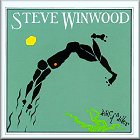 If you were alive and capable of listening to a rock station in 1980, I can guarantee you you’ve heard almost half this album. If that year had an overplayed feel-good motivational song that crowded the airwaves, it had to be “While You See A Chance”. And that airplay overkill wasn’t without reason – it’s actually a good song that exemplifies the sound of this album: solid old-school rock musicianship with a bit of new technology to play with.
If you were alive and capable of listening to a rock station in 1980, I can guarantee you you’ve heard almost half this album. If that year had an overplayed feel-good motivational song that crowded the airwaves, it had to be “While You See A Chance”. And that airplay overkill wasn’t without reason – it’s actually a good song that exemplifies the sound of this album: solid old-school rock musicianship with a bit of new technology to play with.
Steve Winwood had turned out one previous solo album, a self-titled LP in 1977, in his attempt to distance himself from his legacy as the Spencer Davis Group’s “little Stevie Winwood.” Winwood had also been one-third of Traffic (along with Eric Clapton and Ginger Baker), and it was that group to which his debut bore the most similarity. With Arc Of A Diver, Winwood boldly charted a clear path away from the “classic rock” sound with which he had become so closely identified – and to which, in time, he would return.
The synthesizer sound which is so predominant on Arc Of A Diver is the then-new (but later almost ubiquitous) Yamaha DX-7. Winwood made the DX-7 sound his sound with his mastery of that keyboard’s pitch-bend wheel, which lent so much unique character to “While You See A Chance”‘s intro, “Arc Of A Diver”, and his biggest hit single of the early 80s, 1982’s “Valerie”. Growing up playing piano and electronic keyboards, I ached to find that sound. When I finally got a fairly high-end consumer-grade Yamaha keyboard in high school, I made it my mission to bend the pitch-bending ability to my will – all because I wanted to sound just like Winwood did in 1980. Apparently some other people did too – Winwood was called on as a session player to lend that unique sound to artists such as George Harrison.
It’s not all electronic wizardry, though. Real live piano, guitar, bass and drums provide a solid backbone for a synth sound that Winwood knew would be different an alien to the audience, and with that real live rock as a foundation, Arc Of A Diver is safely prevented from falling into experimental new-wave territory. What’s staggering, especially in hindsight given the still-evolving state of recording technology at the time, is how many of those instruments Winwood played himself.
The title track itself is a wondrous mix of soulful, bluesy rock and unusual lyrics. “Since I don’t know your secret code, I’ll need my love to translate,” Winwood sings in the chorus. Tell us about it, Steve.
“Night Train” is a bit of an overblown attempt at a longform song which is nonetheless very enjoyable with its driving beat. (The song’s sheer length, topping out at just under eight minutes, made it a godsend to many a disc jockey who needed to visit the men’s room for a bit. Trust me, I know. I’ve hit the “start” button before and sprinted down the hall as the opening chords rang out.)
One song I’ve always felt is underrated is the relaxing “Spanish Dancer”, both for its music and its lyrics. It’s a bit repetitive, but that lends it a bit of a mesmerizing quality which is probably what kept radio from discovering it.
I was disappointed when, after the much more middle-of-the-road, mainstream rock effort that was 1986’s Back In The High Life, Winwood abandoned his DX-7 and went for a more traditional sound with  Roll With It. On the one hand, we’d grown accustomed to Winwood’s signature 80s sound and there was a danger it was making all of his songs sound the same. But on the other hand, it’s a sound I quite liked – and no one has taken up the challenge of keeping it alive. I miss it. And I guess that’s why I’m so fond of Arc Of A Diver.
Roll With It. On the one hand, we’d grown accustomed to Winwood’s signature 80s sound and there was a danger it was making all of his songs sound the same. But on the other hand, it’s a sound I quite liked – and no one has taken up the challenge of keeping it alive. I miss it. And I guess that’s why I’m so fond of Arc Of A Diver.
- While You See A Chance (5:13)
- Arc Of A Diver (5:29)
- Second-Hand Woman (3:34)
- Slowdown Sundown (5:34)
- Spanish Dancer (5:59)
- Night Train (7:51)
- Dust (6:22)
Released by: Island
Release date: 1980
Total running time: 40:02

Long Walk Home: music from The Rabbit-Proof Fence
Peter Gabriel has always turned out fairly interesting soundtracks, whether they’re built on the same blocks as his solo non-film releases (Birdy) or completely original material (Passion: Music From The Last Temptation Of Christ, or, arguably also a soundtrack, OVO). Long Walk Home manages to fall under the latter category while also delivering a very tantalizing preview of Gabriel’s seventh solo album, Up.
The preview element comes from the fact that many of the musicians who lent their talents to this film score – perhaps most notably the legendary gospel group, the Blind Boys Of Alabama – are also playing a part on Gabriel’s next solo album. On its own, Long Walk Home is a hauntingly atmospheric accompaniment to an Australian film about three Aborigine children kidnapped and sold into servitude. They escape, using the rabbit-proof fence that divides the country to find their way back home. Given the movie’s subject matter, the emphasis on dijeridoo on the first half of the CD is appropriate, but it’s also beautiful. Gabriel has become so well known for using elements of Middle Eastern music in his own works that it’s easy to forget that there are a lot of other styles we haven’t heard him employ, and this redresses the balance nicely.
Toward of the score, the Blind Boys of Alabama take center stage, gradually beginning to add a soulful, wordless vocal to the music, and the effect is breathtaking. On the first listening, I was thinking to myself, “Well, that’s an interesting choice. Now it almost sounds more like music from a movie about the American civil rights movement.” But the more I thought about it, the more I realized the parallel is utterly appropriate, and either way, the music is strikingly beautiful and haunting. It’s not background music. It still stops me dead in my tracks whenever the voices of Blind Boys of Alabama rise into the mix.
 Now I’m starting to wish that The Rabbit-Proof Fence, the movie for which this music was composed, were available on this side of the equator. Ah well…I suppose that’s what multi-region DVD players are for. In any event, the soundtrack is a must-hear, even if you’re slightly disappointed that it’s not Gabriel’s new solo project. Once you hear Long Walk Home, I think you’ll get over any such disappointment.
Now I’m starting to wish that The Rabbit-Proof Fence, the movie for which this music was composed, were available on this side of the equator. Ah well…I suppose that’s what multi-region DVD players are for. In any event, the soundtrack is a must-hear, even if you’re slightly disappointed that it’s not Gabriel’s new solo project. Once you hear Long Walk Home, I think you’ll get over any such disappointment.
- Jigalong (4:03)
- Stealing The Children (3:20)
- Unlocking The Door (1:58)
- The Tracker (2:47)
- Running To The Rain (3:19)
- On The Map (1:00)
- A Sense Of Home (1:59)
- Go Away Mr. Evans (5:15)
- Moodoo’s Secret (3:03)
- Gracie’s Recapture (4:40)
- Crossing The Salt Pan (5:08)
- The Return, Parts 1, 2 and 3 (10:26)
- Ngankarrparni (Sky Blue – reprise) (6:01)
- The Rabbit Proof Fence (1:07)
- Cloudless (4:50)
Released by: RealWorld
Release date: 2002
Total running time: 58:58
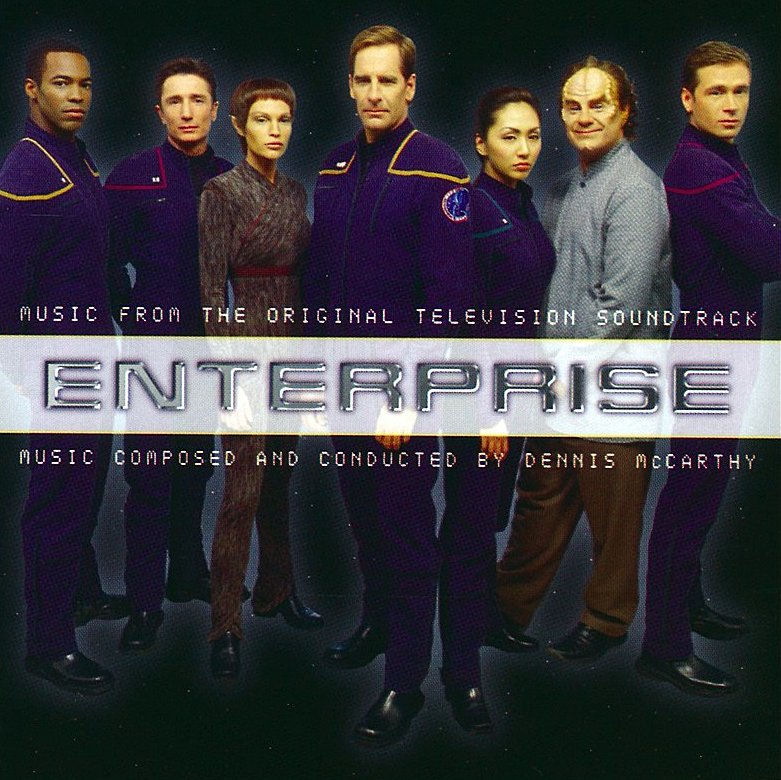
Star Trek: Enterprise – music by Dennis McCarthy
 My sincere apologies to Dennis McCarthy. I initially shrugged off the music from Enterprise when I watched the pilot movie – I liked the theme song and opening credits (and, by the sound of things, I’m one of approximately five people who openly admit to liking the song, and one of the others is Rick Berman, if that tells you anything). Now I realize that my beef is with Berman, not McCarthy. The newly released soundtrack from the pilot movie is actually a fine addition to the musical canon of Star Trek.
My sincere apologies to Dennis McCarthy. I initially shrugged off the music from Enterprise when I watched the pilot movie – I liked the theme song and opening credits (and, by the sound of things, I’m one of approximately five people who openly admit to liking the song, and one of the others is Rick Berman, if that tells you anything). Now I realize that my beef is with Berman, not McCarthy. The newly released soundtrack from the pilot movie is actually a fine addition to the musical canon of Star Trek.
Topped and tailed with two different versions of Russell Watson’s rendition of “Where My Heart Will Take Me” (originally written by Diane Warren), the Enterprise soundtrack CD features most of the hour-long score, excluding a few source music cues, recorded for the two-hour episode. One of the nicer things about the score from Broken Bow, the two-hour pilot movie, is the all-American-flavored theme used for both Captain Archer and the Enterprise herself (which you do actually get to hear in the show each week – as the end credit music, on the rare occasion that UPN doesn’t do the annoying but almost ubiquitous credit squeeze). Like the theme McCarthy coined for Captain Picard some 15 years ago, Archer’s theme fits perfectly and has its own grand sweep (though sadly, like Picard’s theme, it seems to have disappeared from regular use over the course of the show’s first season, probably due to Berman’s aversion to any of the composers creating specific themes associated with any character). Many of the tracks are infused with an edgy energy that may come from the musicians’ and conductor’s reactions to other events that occurred on the second day of the scoring sessions for the pilot: September 11th, 2001. (In his liner notes, McCarthy dedicates the music on this CD to victims of that tragedy.)
Some of the music will sound familiar – “Klingon Chase / Shotgunned” in particular, though it’s among my favorite tracks, sounds like it could easily be slotted into the soundtrack from Star Trek: Generations. (I do like that menacing downbeat chord combination, though.) McCarthy even steps right up to the edge of quoting his own theme music from Deep Space Nine in the next-to-last track, “New Horizons”. The music also gets slimy, low-key and discordant for scenes involving the shape-shifting Suliban, and downright weird (but in a good way) for the climactic, time-warped fight in the track “Temporal Battle”.
Some fans – those other four people out there who like the song (and I’m sure Berman’s already gotten his copy of the CD) – will also be pleased to hear both the long album version and the shortened TV version of “Where My Heart Will Take Me”. I still find it to be an inspiring little number, especially when combined with the show’s opening title montage. Quite why fandom has bared its teeth at this song and the opening credits, I just haven’t managed to comprehend yet. I actually thought it was a nice switch from the usual Goldsmithian-sounding opening credits that have become de rigeur for Star Trek spinoffs.
I was surprised to see this album appear on Decca, rather than GNP/Crescendo, which has done an excellent job of giving us one to two Star Trek (or related) CDs a year since 1991 or so. From what I understand, this is more to do with the behind-the-scenes negotiating needed to include Russell Watson’s theme song on the CD, not a reflection of any kind of dissatisfaction on Paramount’s part with Crescendo Records. GNP/Crescendo certainly could have done better with the packaging, which is kind of bland here – though there’s only so much you can do with those pre-launch publicity photos where the crew looks like they’re standing inside the round-patterned walls of Doctor Who’s TARDIS.
Hopefully more Enterprise music will be forthcoming, whether Decca or Crescendo issues it. Some of the first season’s episodes have had very interesting music, with the most notable being the surprisingly melodic Vox Sola, with its sly, sinewy theme for the parasitic life form. Crescendo has already turned out a “Best Of Season One” CD for Stargate SG-1, and hopefully they may follow suit with Enterprise – even if it means ditching “Where My Heart Will Take Me” from future releases; after all, we have it on this CD. (Sadly missing, however, is the  acoustic guitar rendition of that song which was heard only on the un-squished end credits of the pilot episode; the track “Archer’s Theme” is now used as the end credit music.)
acoustic guitar rendition of that song which was heard only on the un-squished end credits of the pilot episode; the track “Archer’s Theme” is now used as the end credit music.)
Love it or hate it, Enterprise is worth a listen. Kudos to Dennis McCarthy for introducing some new energy and material into his Trek repertoire – don’t stop now, Dennis! The show desperately needs it.
- Where My Heart Will Take Me – Album Version (4:09)
- New Enterprise (1:40)
- Klingon Chase / Shotgunned (2:05)
- Enterprise First Flight (2:50)
- Klang-Napped (2:10)
- Morph-o-Mama / Suli-Nabbed (2:45)
- Phaser Fight (5:53)
- Breakthrough (2:01)
- Grappled (4:09)
- The Rescue (6:40)
- Temporal Battle (8:05)
- Blood Work (2:11)
- New Horizons (1:26)
- Archer’s Theme (1:24)
- Where My Heart Will Take Me – TV Version (1:28)
Released by: Decca / Universal
Release date: 2002
Total running time: 49:22
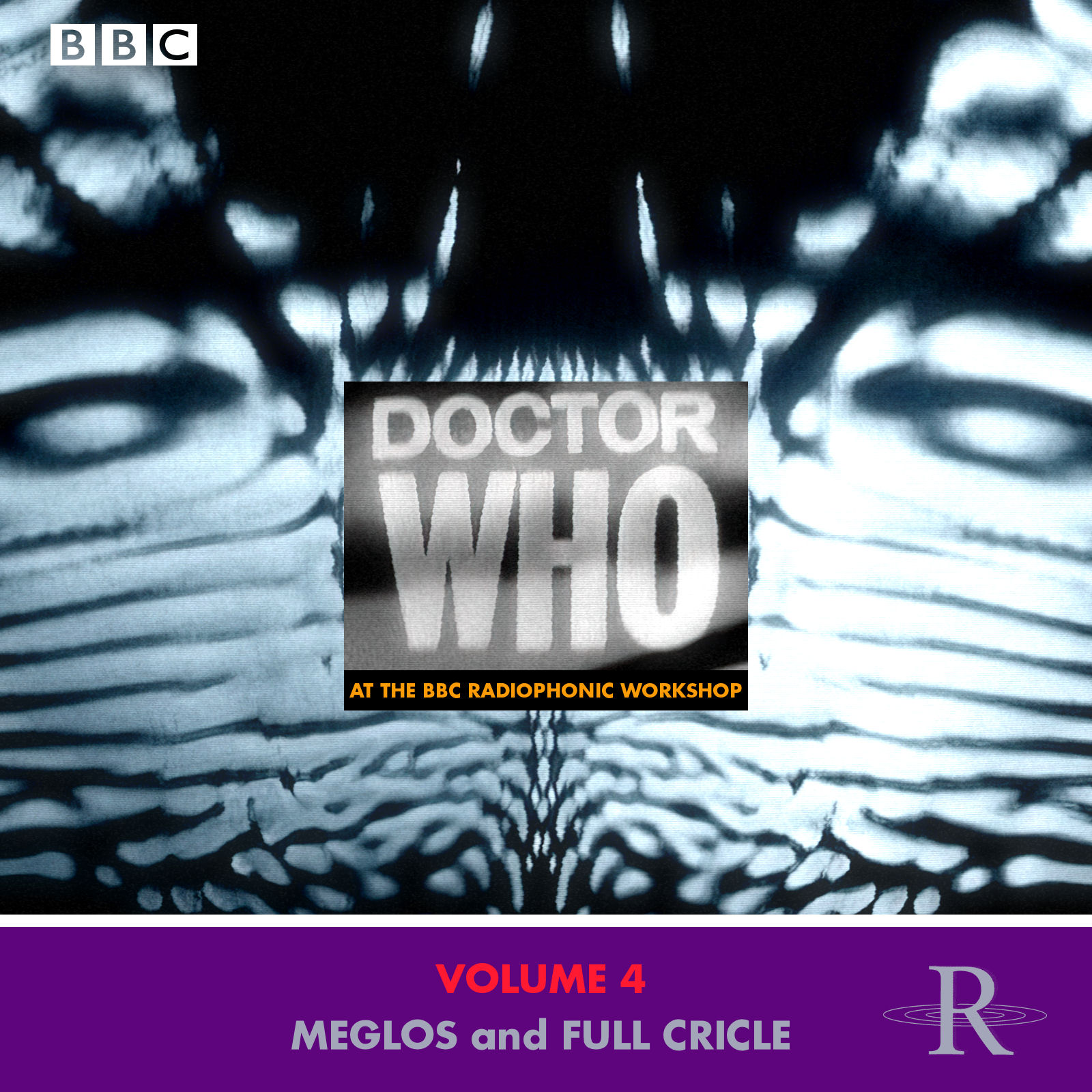
Doctor Who, Volume 4: Meglos / Full Circle
 As the BBC’s excellent range of remastered Doctor Who music CDs reaches into the early 80s era of the show, sonic gems are being unearthed for the first time in years. If any proof be needed, check out the music from Full Circle, a 1980 story infamous in some fans’ eyes for introducing awkward youth Adric to the TARDIS crew. Paddy Kingsland’s memorable melodic score for Full Circle features a number of themes that beg – no, demand – to be hummed long after you’ve hit the stop button. Kingsland went on to score many other Doctor Who episodes, including the pivotal regeneration story Logopolis, but even though he has an instantly recognizable style, he seldom repeats actual material from story to story. (Kingsland’s trademark style was also a big part of the musical sound of The Hitchhiker’s Guide To The Galaxy.) Unusually, the other score featured on this disc was divided up between Kingsland and Peter Howell (who arranged the most enduring of the 1980s’ versions of the Doctor Who theme). Meglos was a bit of a muddled exercise as far as storytelling goes, but musically it takes an interesting approach, including the use of a vocoder to weave random syllables and occasionally even story-relevant “lyrics” into the music.
As the BBC’s excellent range of remastered Doctor Who music CDs reaches into the early 80s era of the show, sonic gems are being unearthed for the first time in years. If any proof be needed, check out the music from Full Circle, a 1980 story infamous in some fans’ eyes for introducing awkward youth Adric to the TARDIS crew. Paddy Kingsland’s memorable melodic score for Full Circle features a number of themes that beg – no, demand – to be hummed long after you’ve hit the stop button. Kingsland went on to score many other Doctor Who episodes, including the pivotal regeneration story Logopolis, but even though he has an instantly recognizable style, he seldom repeats actual material from story to story. (Kingsland’s trademark style was also a big part of the musical sound of The Hitchhiker’s Guide To The Galaxy.) Unusually, the other score featured on this disc was divided up between Kingsland and Peter Howell (who arranged the most enduring of the 1980s’ versions of the Doctor Who theme). Meglos was a bit of a muddled exercise as far as storytelling goes, but musically it takes an interesting approach, including the use of a vocoder to weave random syllables and occasionally even story-relevant “lyrics” into the music.
 The disc’s material has been fully remastered and remixed into stereo by Mark Ayres, and the effort poured into archiving and preserving the music is outstanding. Simply to have the music from Full Circle on CD has been a dream of mine for years – almost since I first saw the show – and that alone makes this latest volume of the BBC’s Doctor Who music series a worthwhile purchase.
The disc’s material has been fully remastered and remixed into stereo by Mark Ayres, and the effort poured into archiving and preserving the music is outstanding. Simply to have the music from Full Circle on CD has been a dream of mine for years – almost since I first saw the show – and that alone makes this latest volume of the BBC’s Doctor Who music series a worthwhile purchase.
- Doctor Who: Opening Theme (0:38)
- Burnout On Walkway 9 (1:10)
- The Deons (1:29)
- K9 Repaired (0:16)
- The Screens Of Zolpha-Thura (3:09)
- The Last Zolpha-Thuran (3:31)
- Chronic Hysteresis (1:59)
- To Tigella (1:55)
- The Deon Oath (1:24)
- The Power Room (0:51)
- The Bell Plants (2:10)
- Meglos (1:31)
- “She’s Seen Too Much!” (1:40)
- The Dodecahedron (1:43)
- The Ultimate Impossibility (1:01)
- The Deons Take Command (2:31)
- Earthling (1:04)
- Sacrifice (4:09)
- Other Lives To Save (1:17)
- Countdown (4:14)
- Summons To Gallifrey (1:27)
- Alzarius / The Outlers (1:07)
- The System Files / Adric (1:15)
- Mistfall (4:15)
- The Starliner (0:47)
- Decider Deceased (0:35)
- Adric Finds The TARDIS (0:40)
- Starliner Sealed (0:54)
- The Giants Leave The Swamp (1:57)
- K9 On A Mission / Third Decider (1:23)
- TARDIS Taken (1:57)
- The Marsh Child / K9 Loses His Head (2:43)
- The Spiders I (1:26)
- The Spiders II (0:26)
- A Little Patience (1:14)
- Romana Comatose (0:49)
- The Bookroom (0:34)
- The Experiment (1:22)
- The Work Of Maintenance (0:50)
- Marshmen I (2:43)
- Blue Veins (2:01)
- Marshmen II (1:24)
- No Return (1:01)
- Oxygen (3:02)
- Full Circle / The Deciders Decide (2:29)
- Doctor Who: Closing Theme (1:18)
Released by: BBC Music
Release date: 2002
Total running time: 77:48

